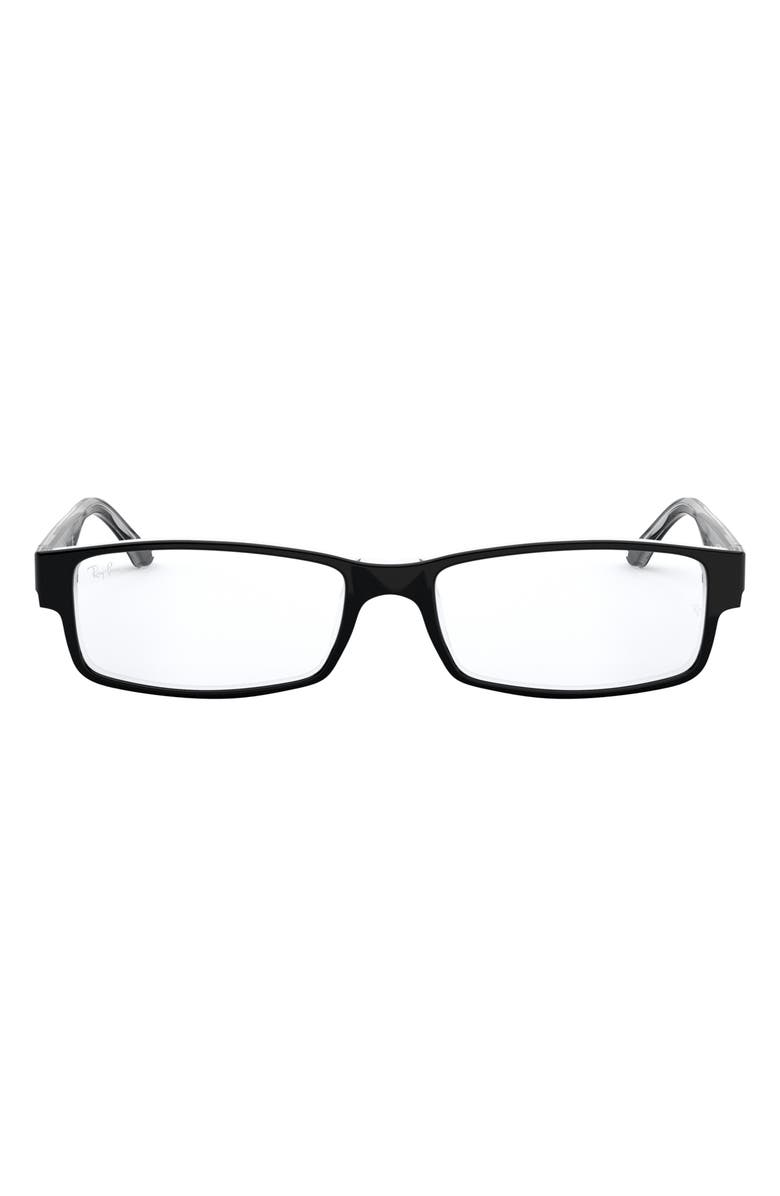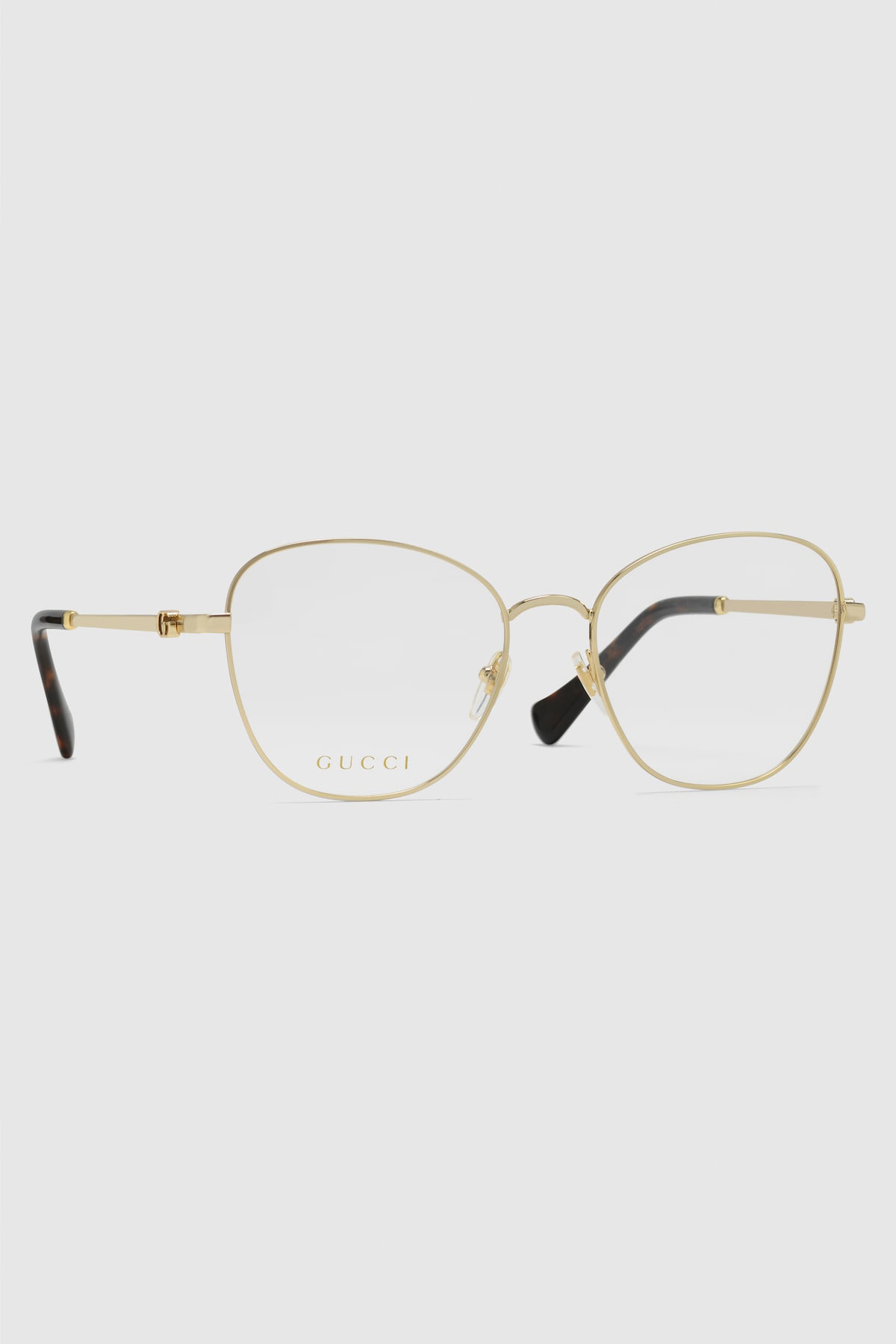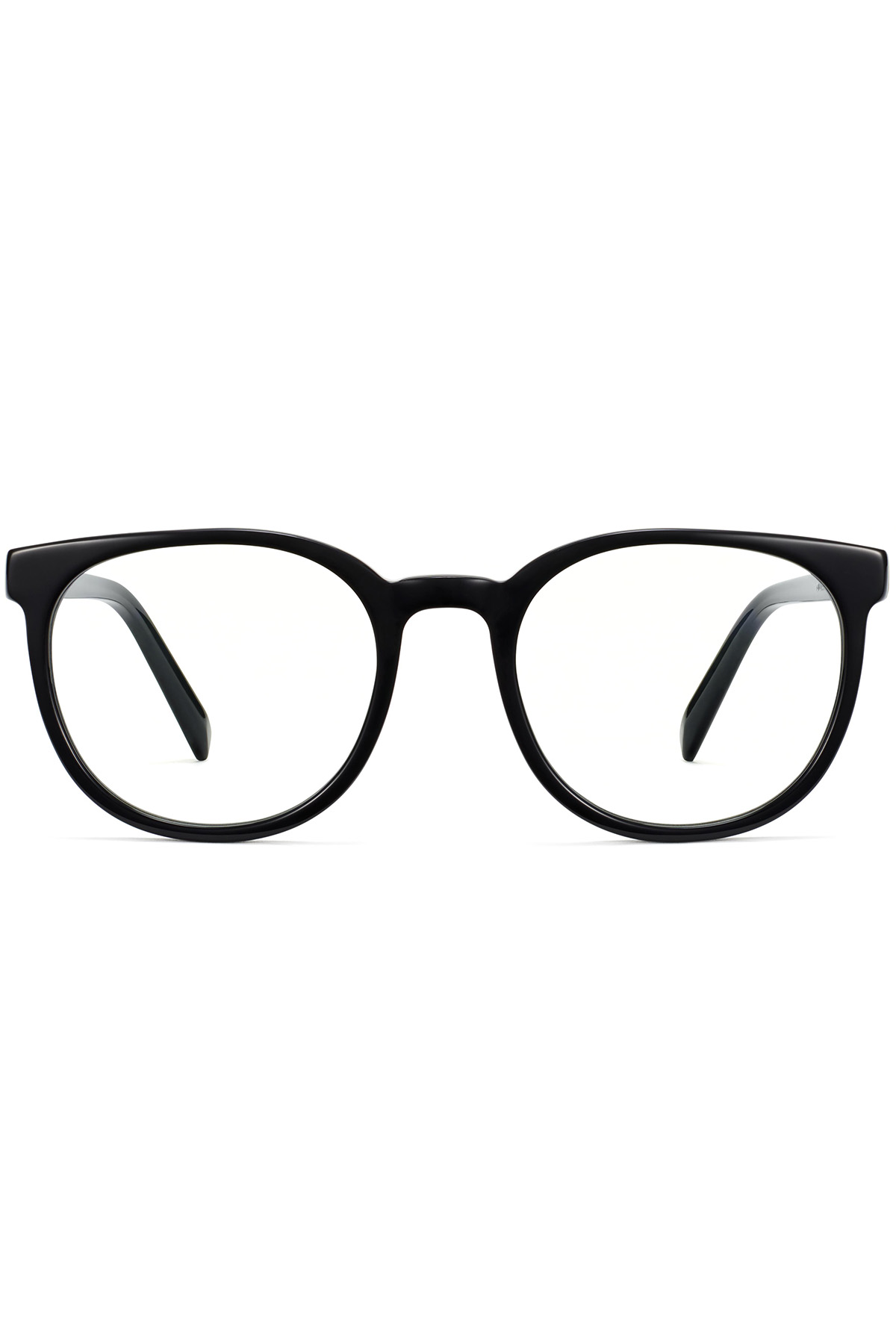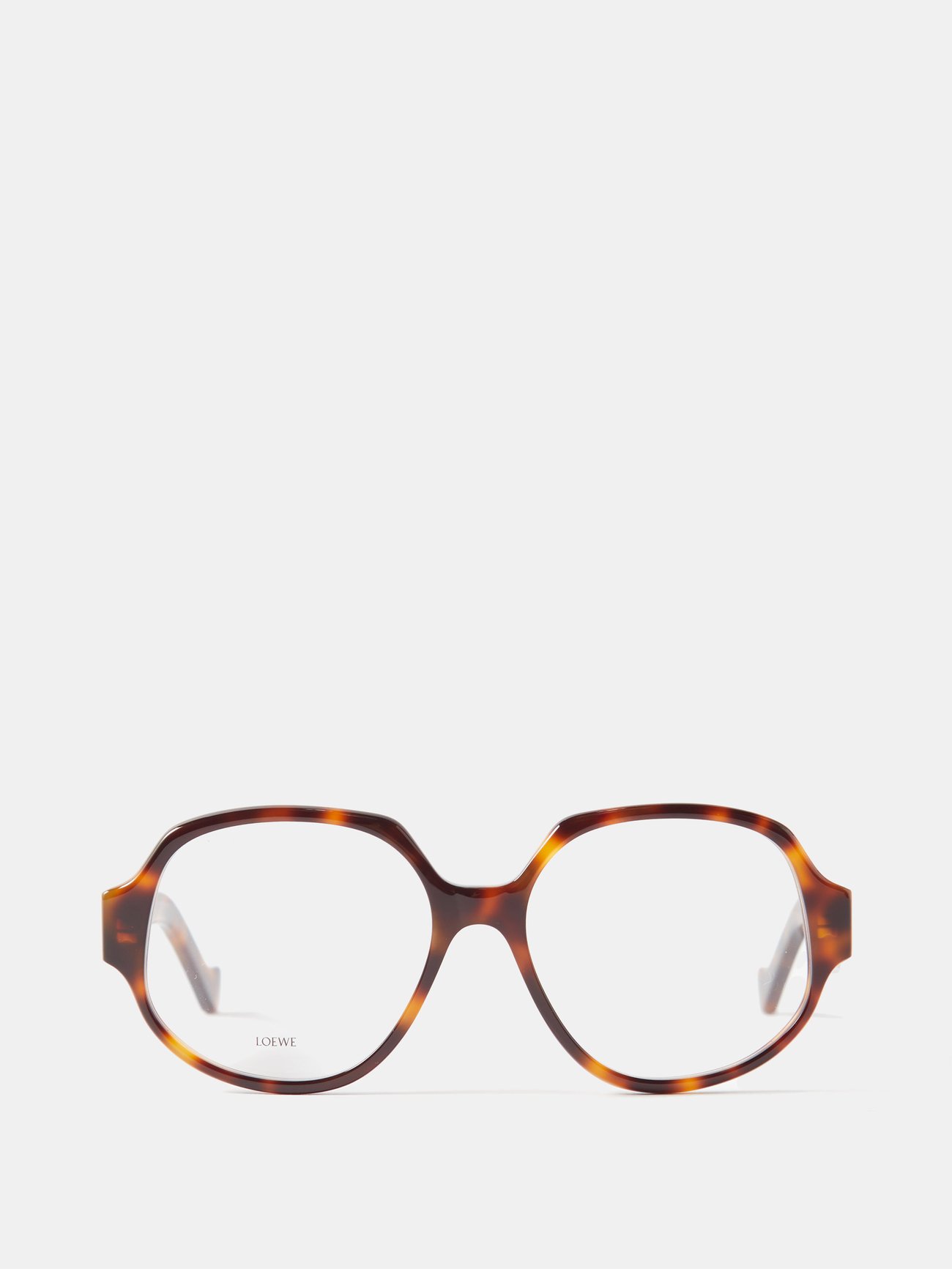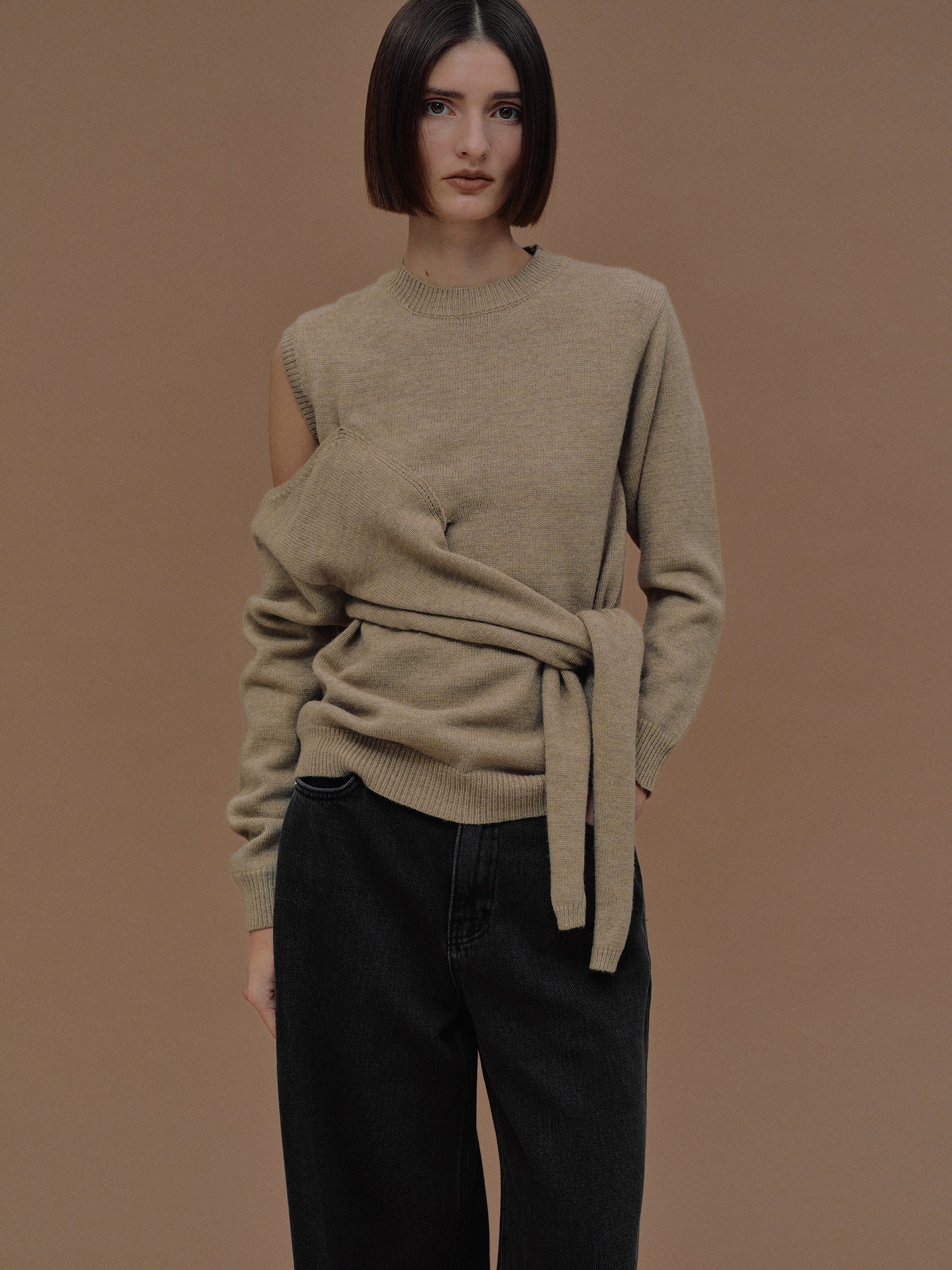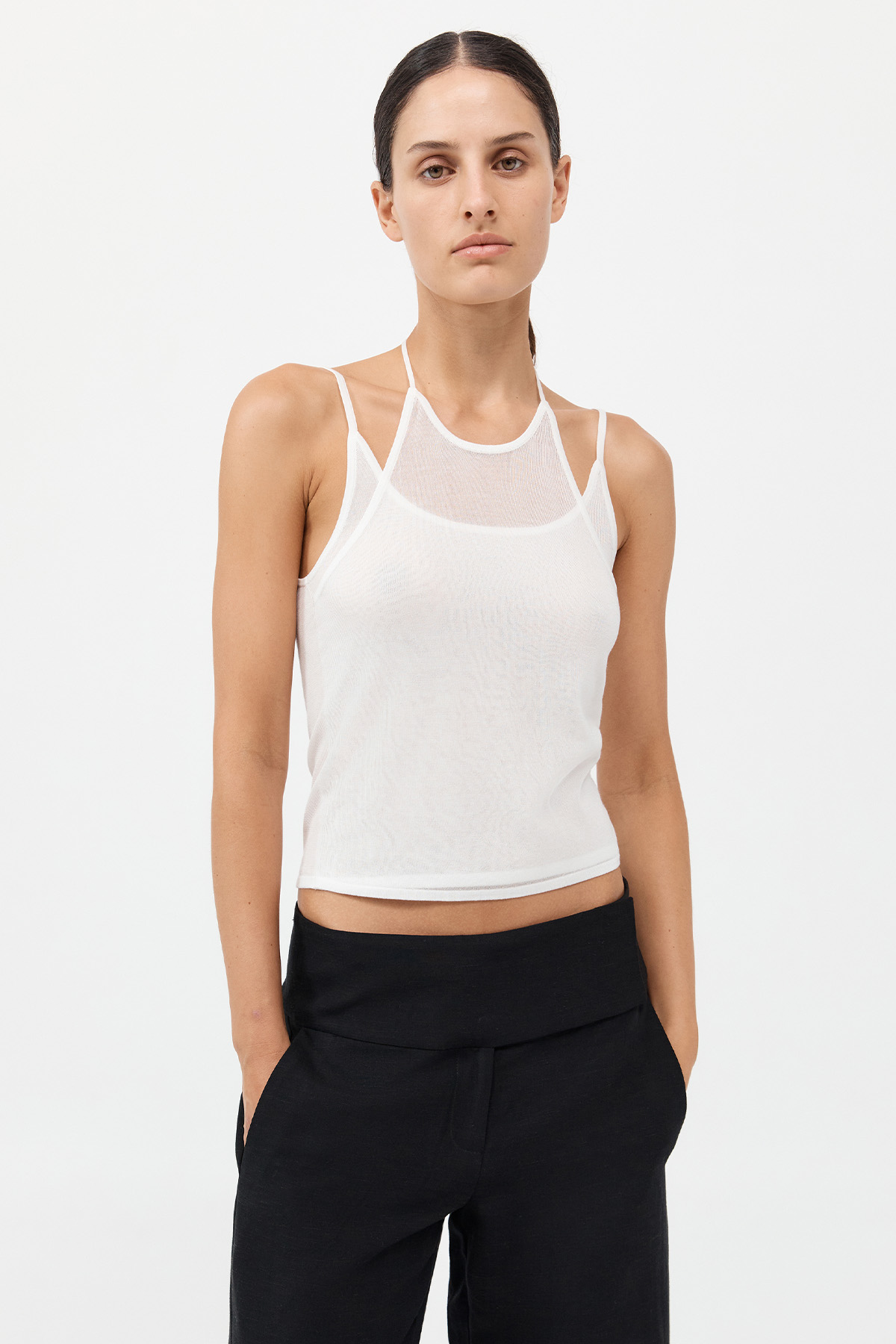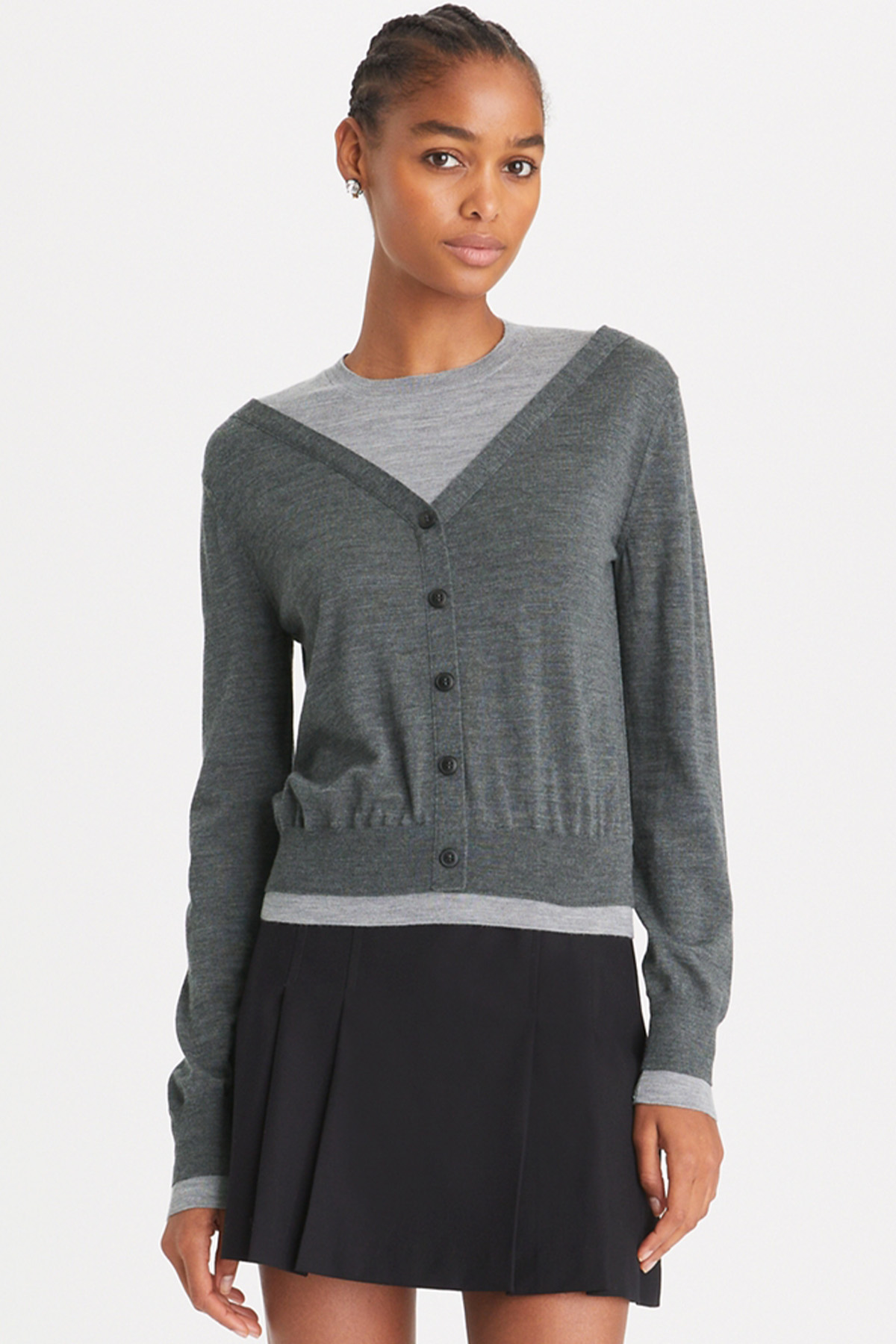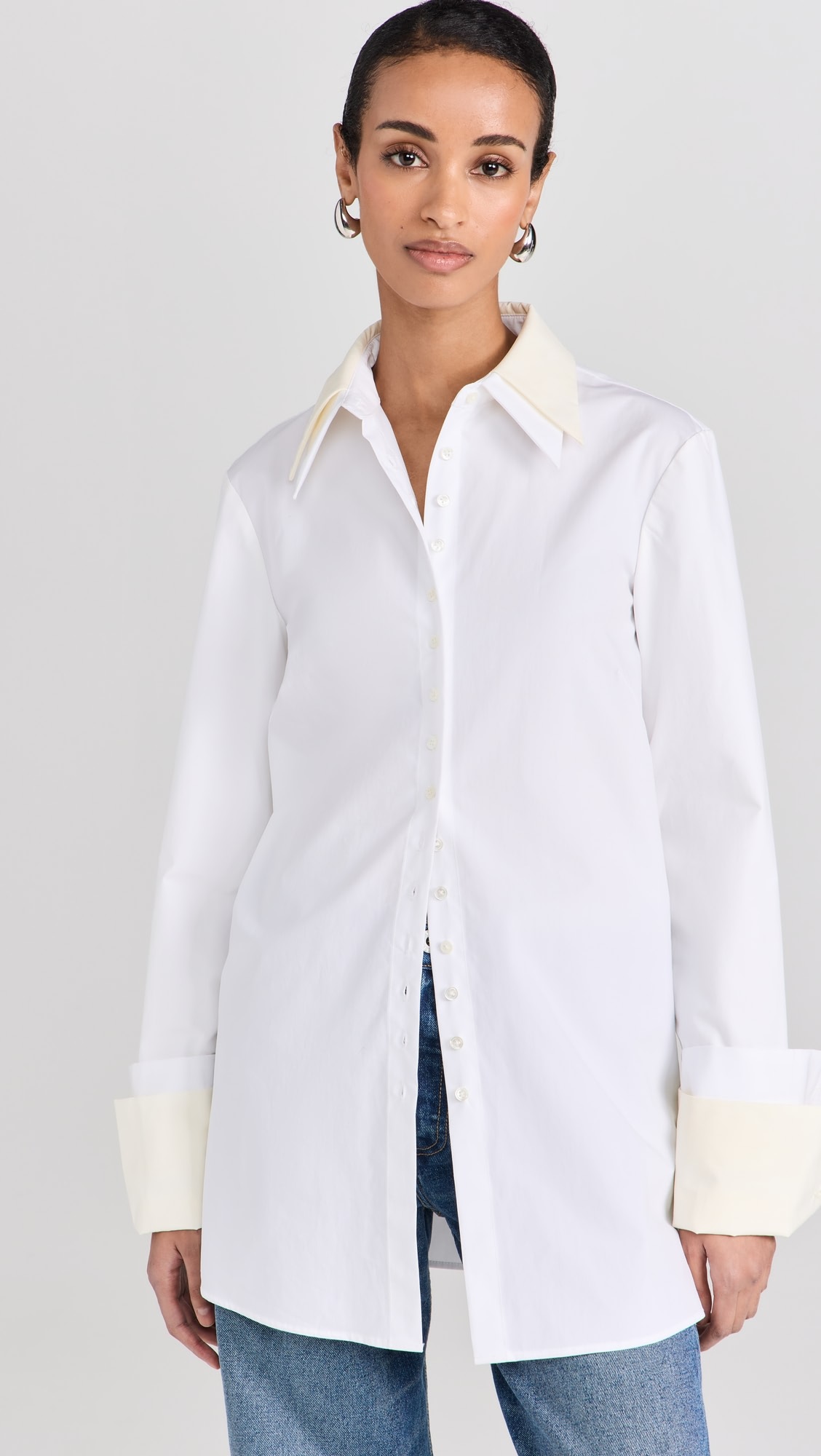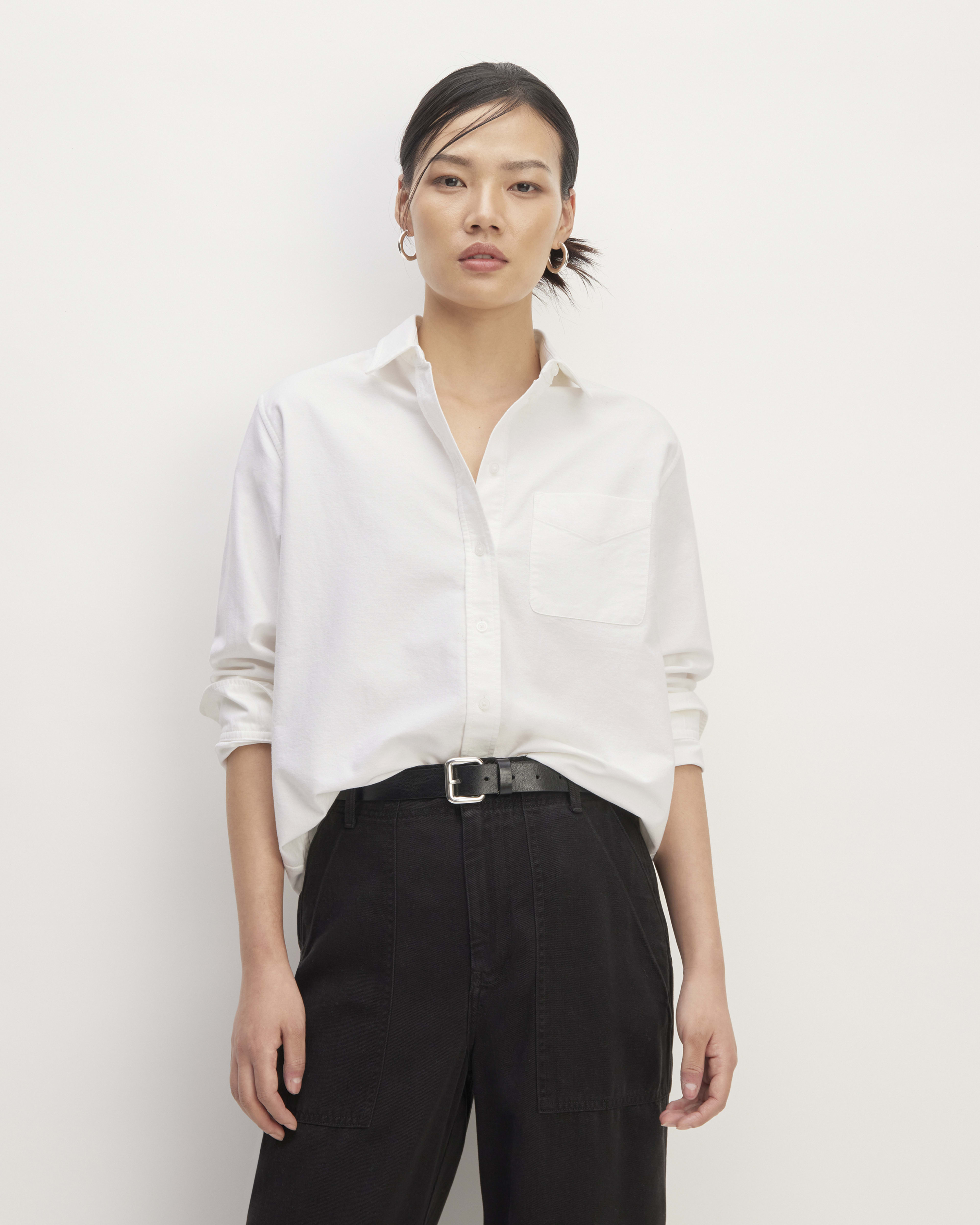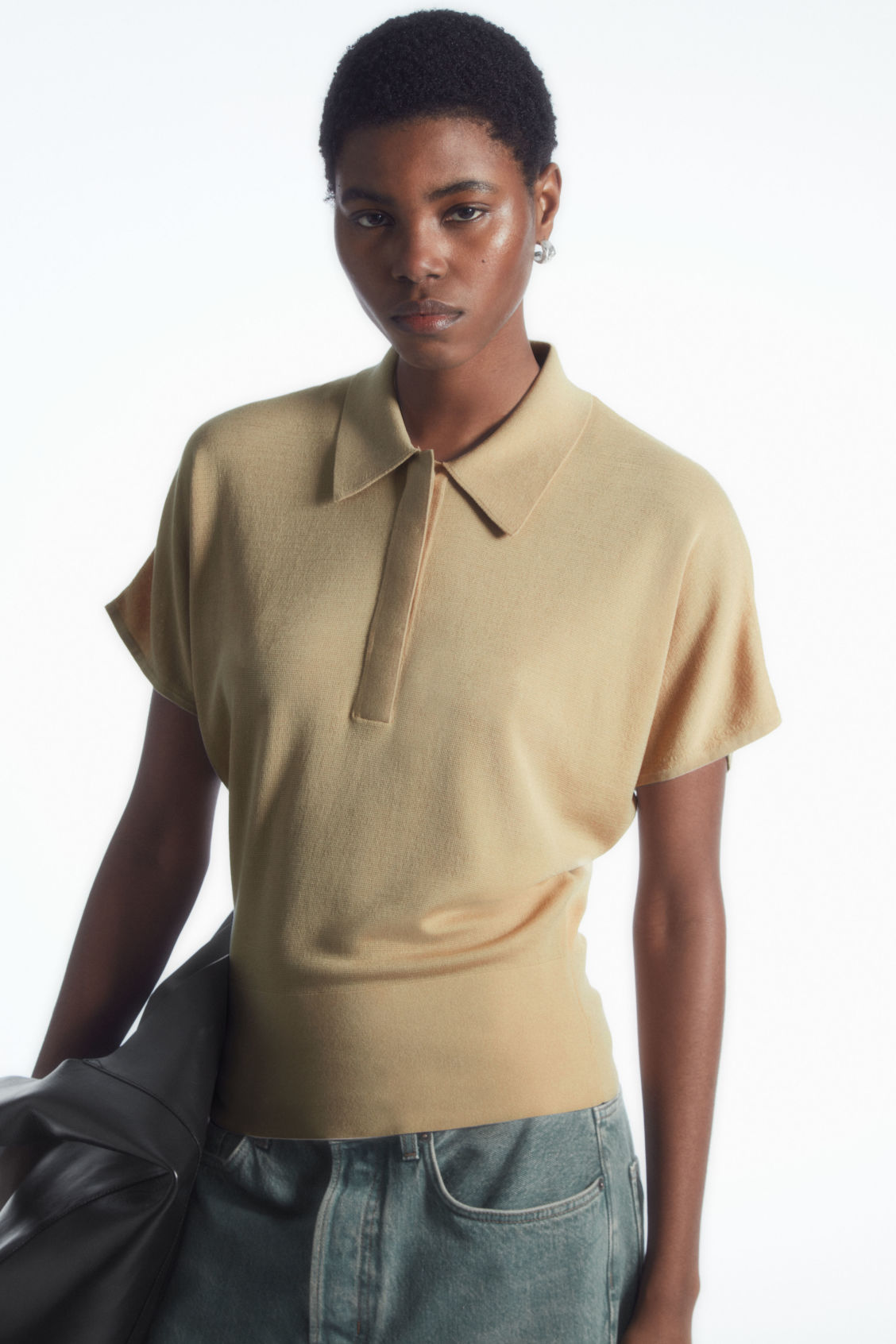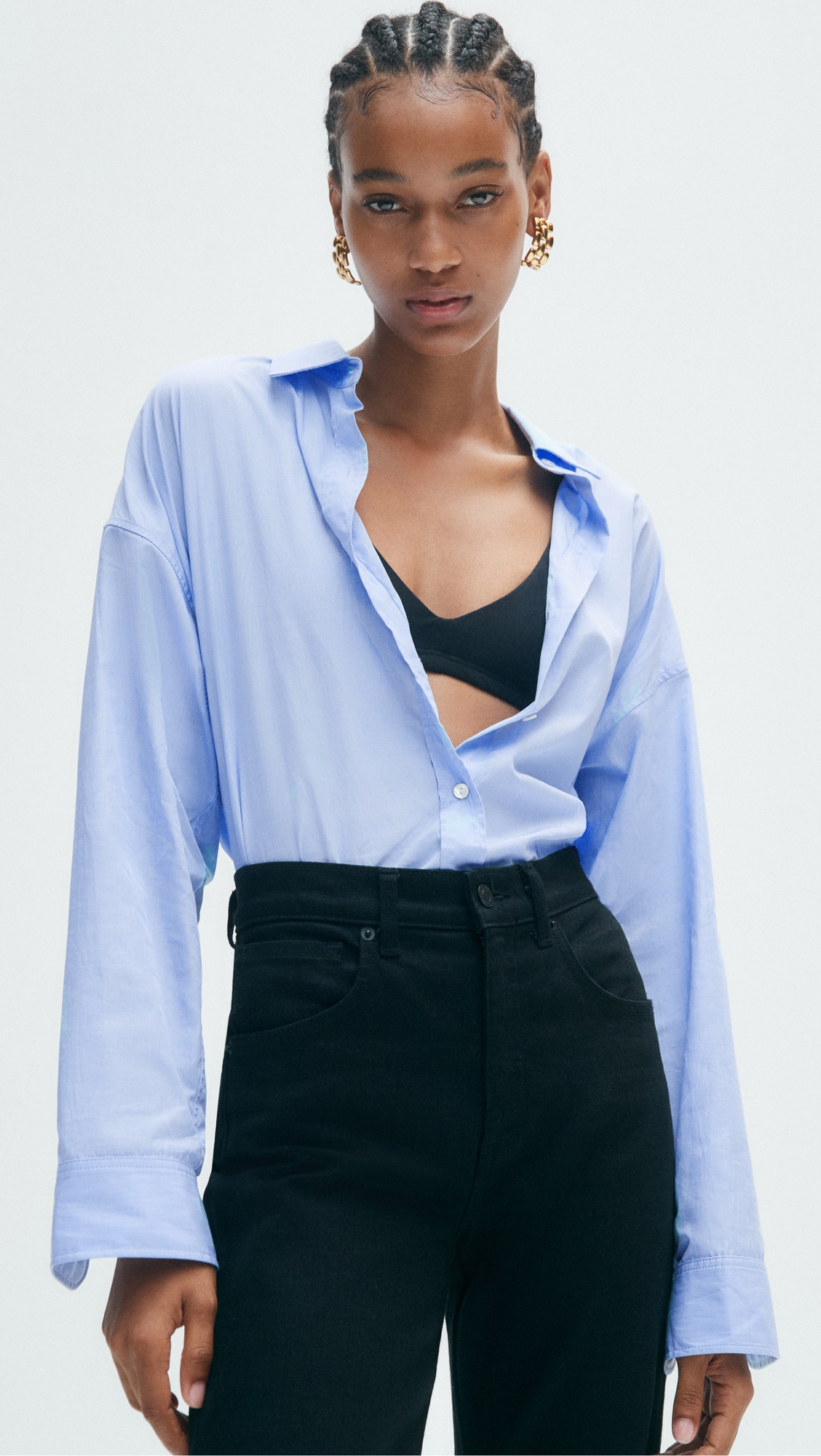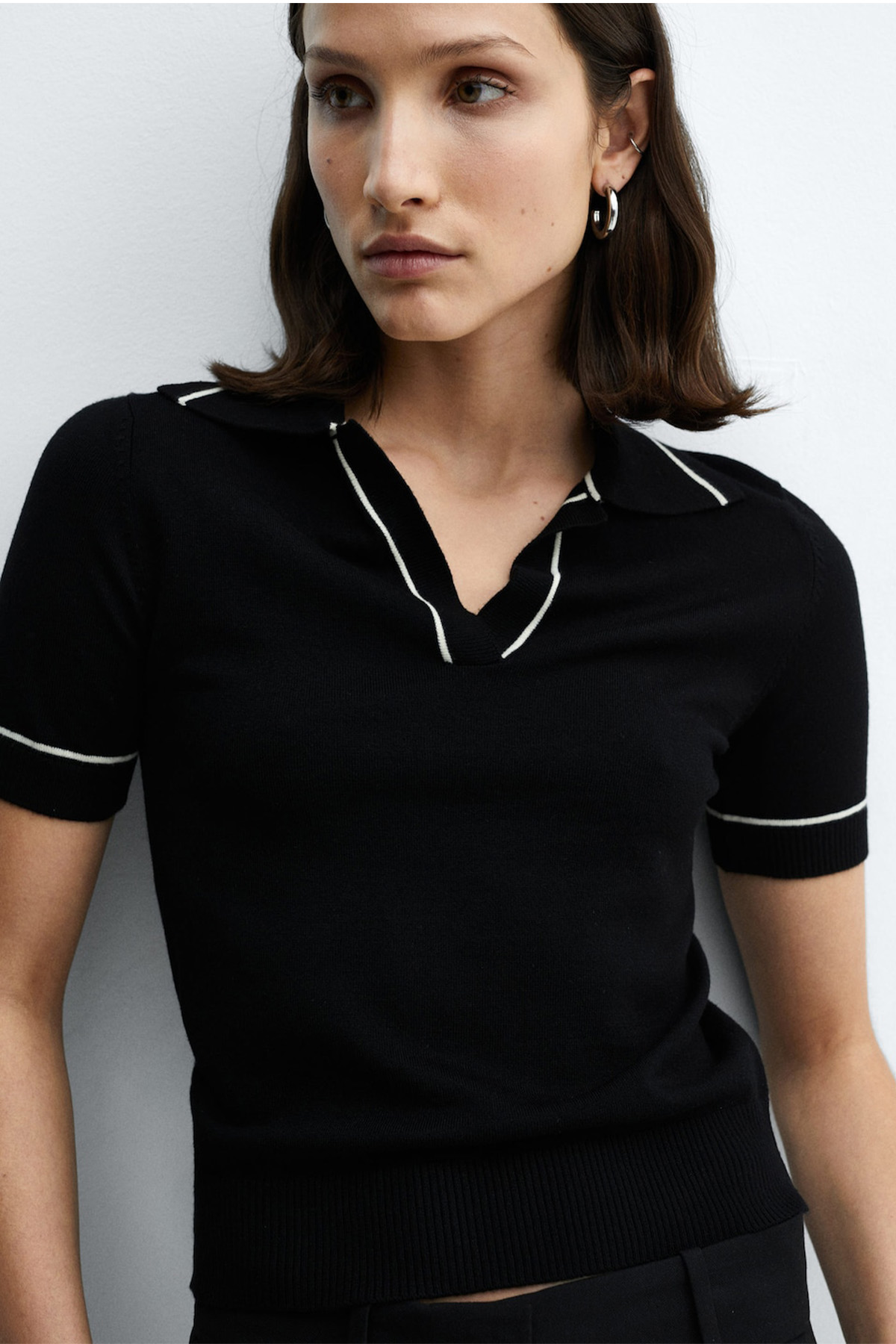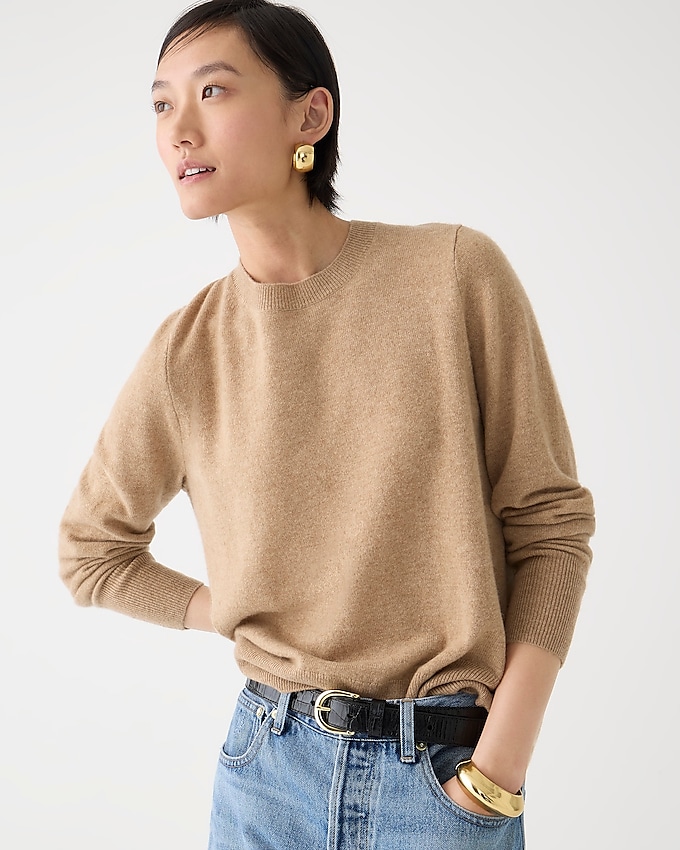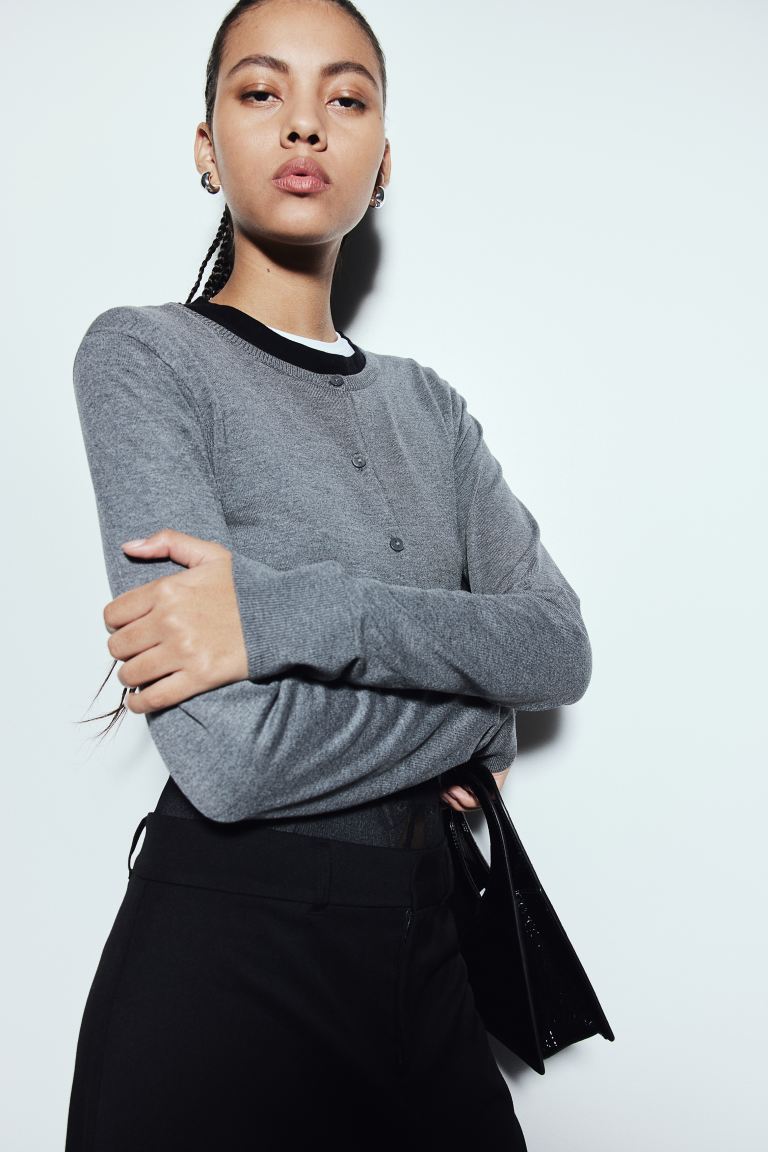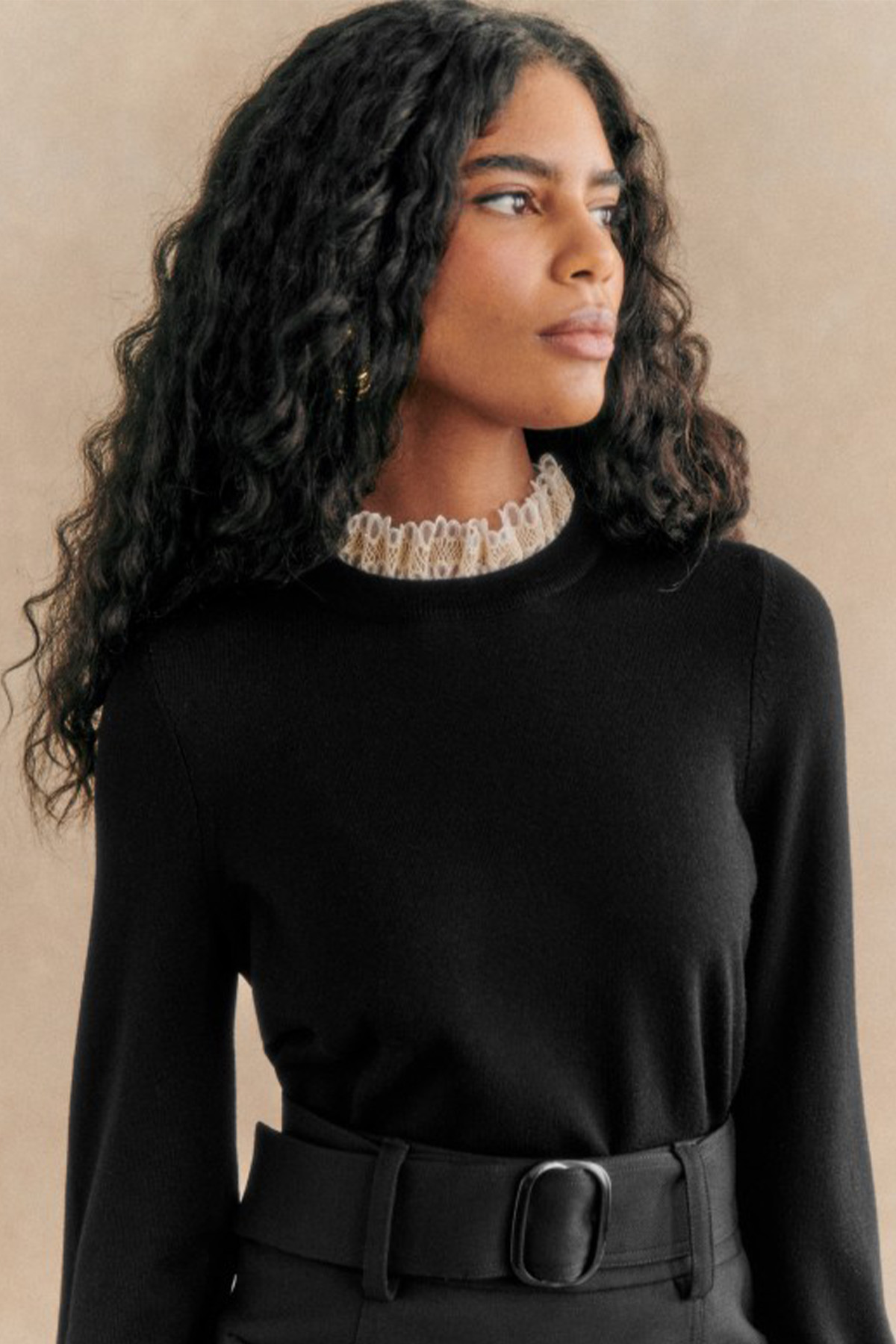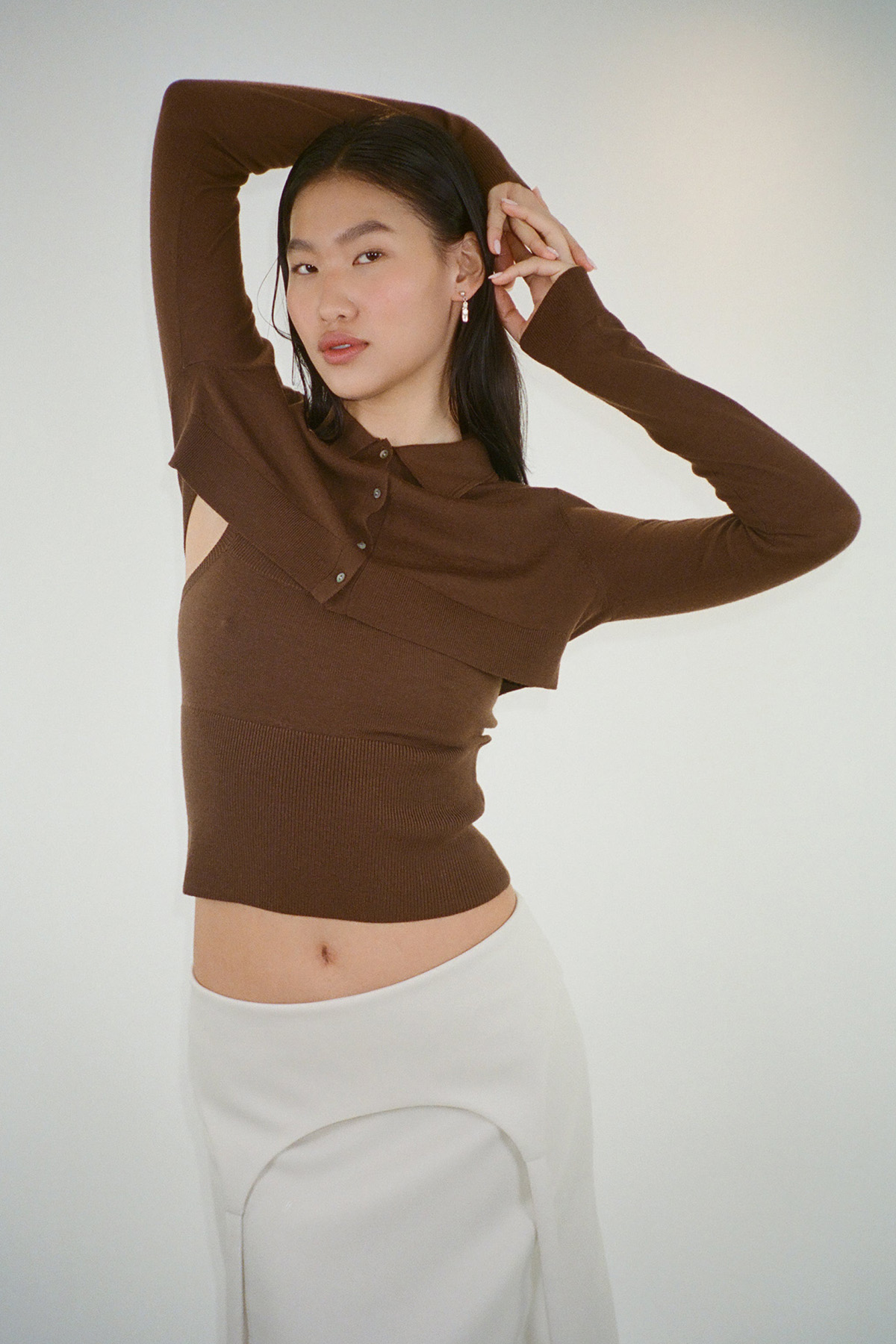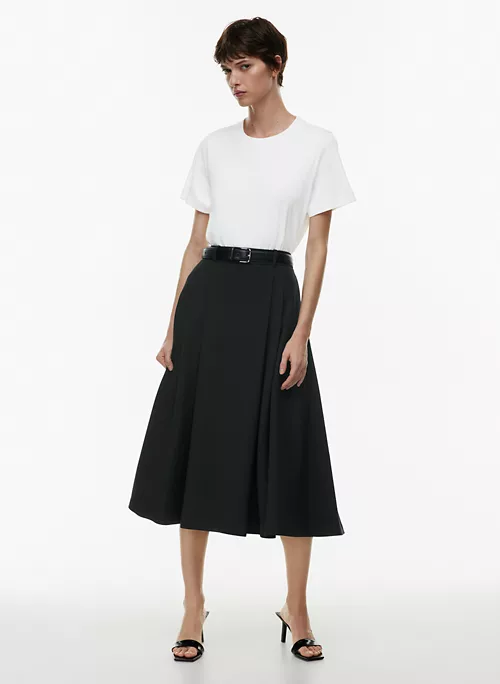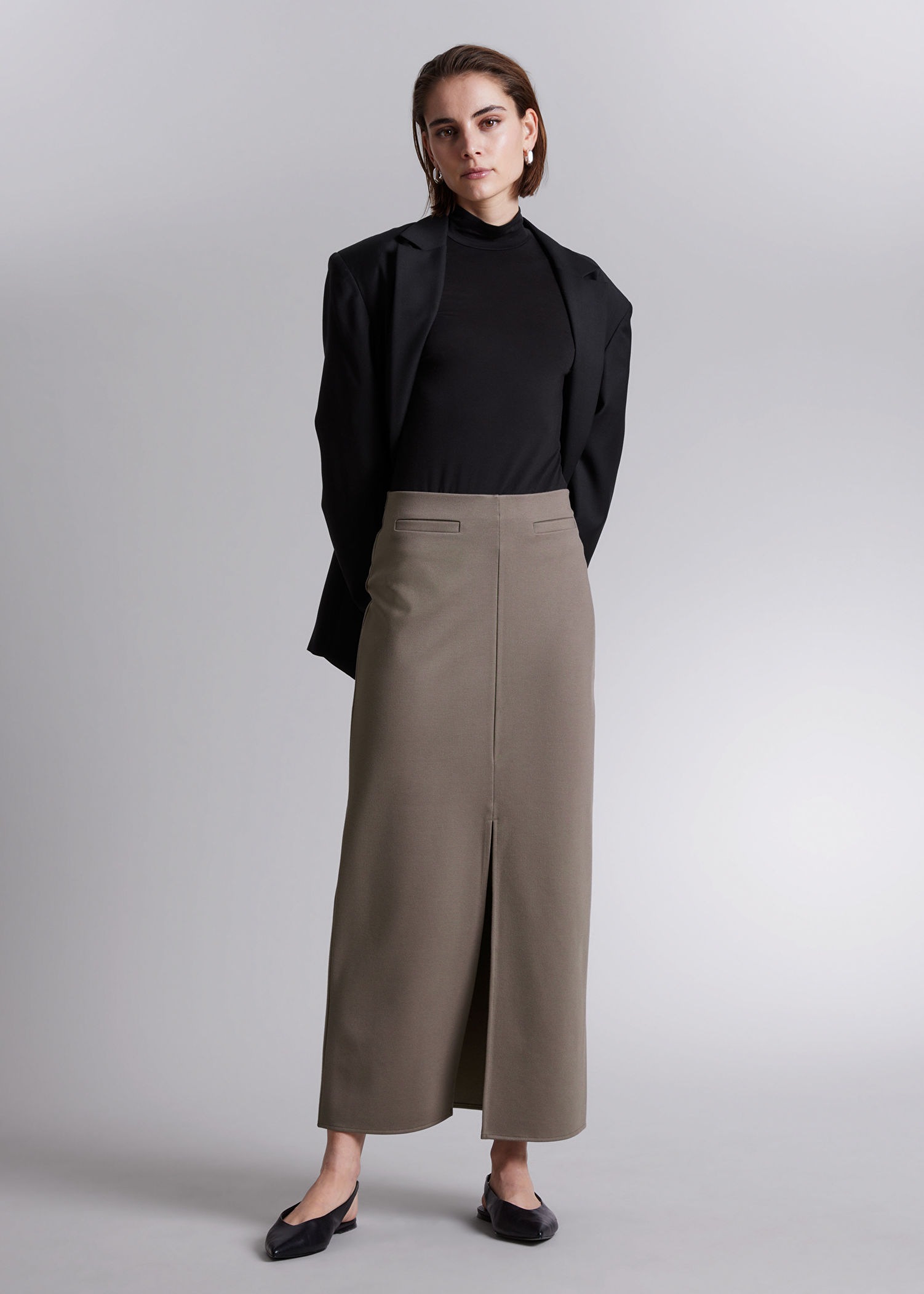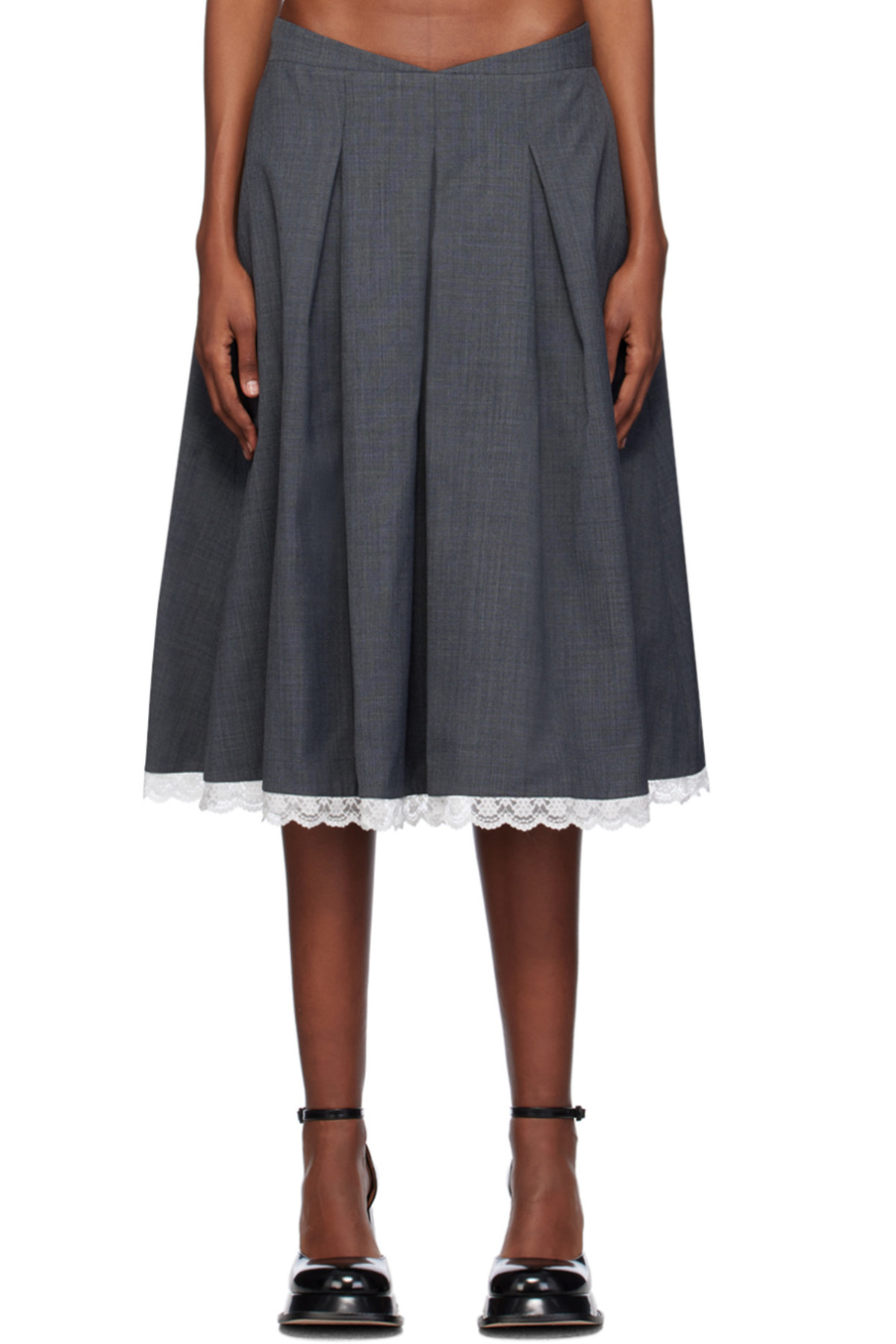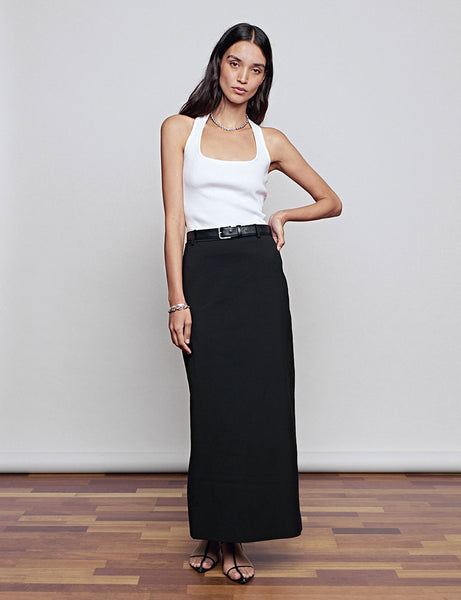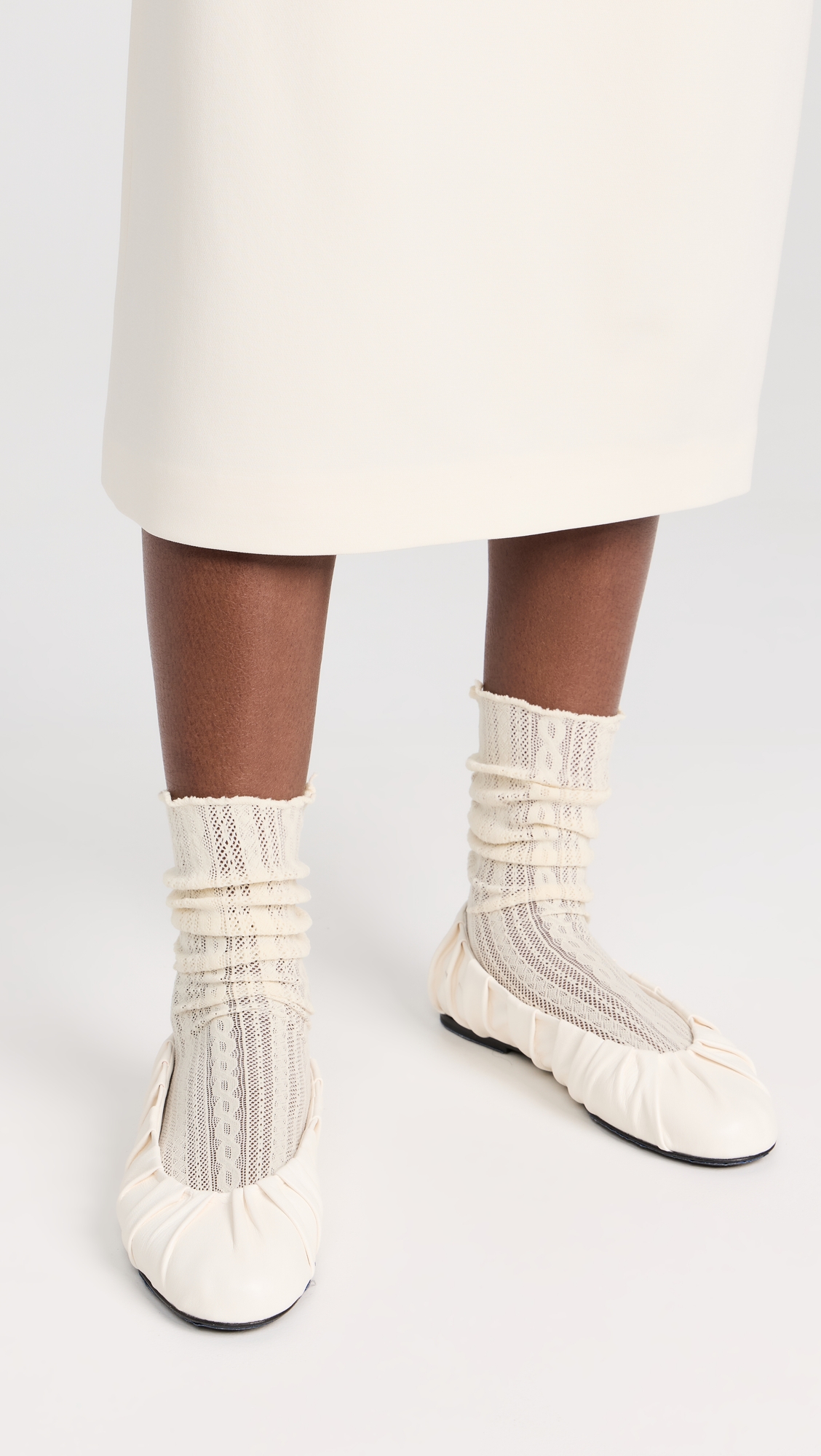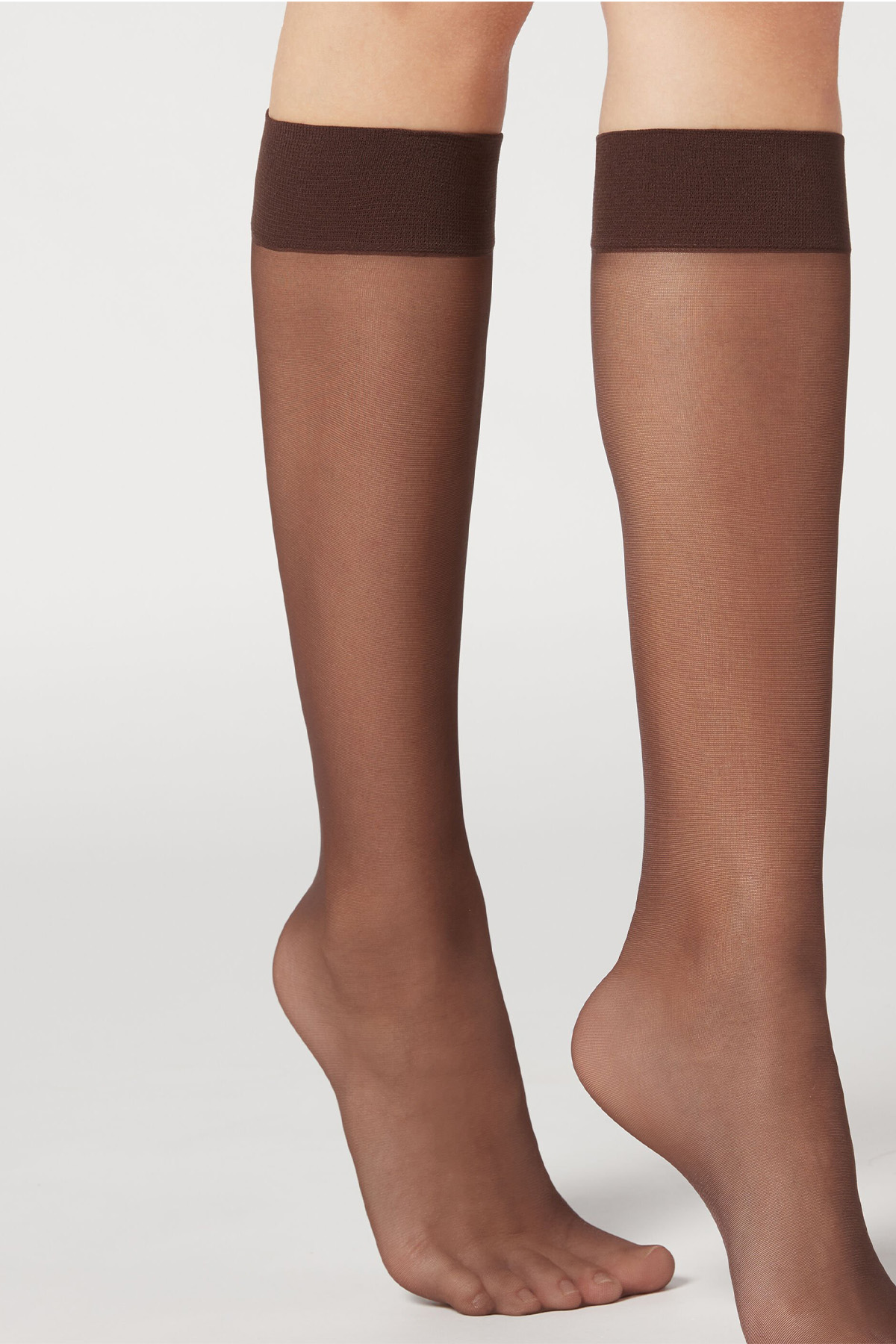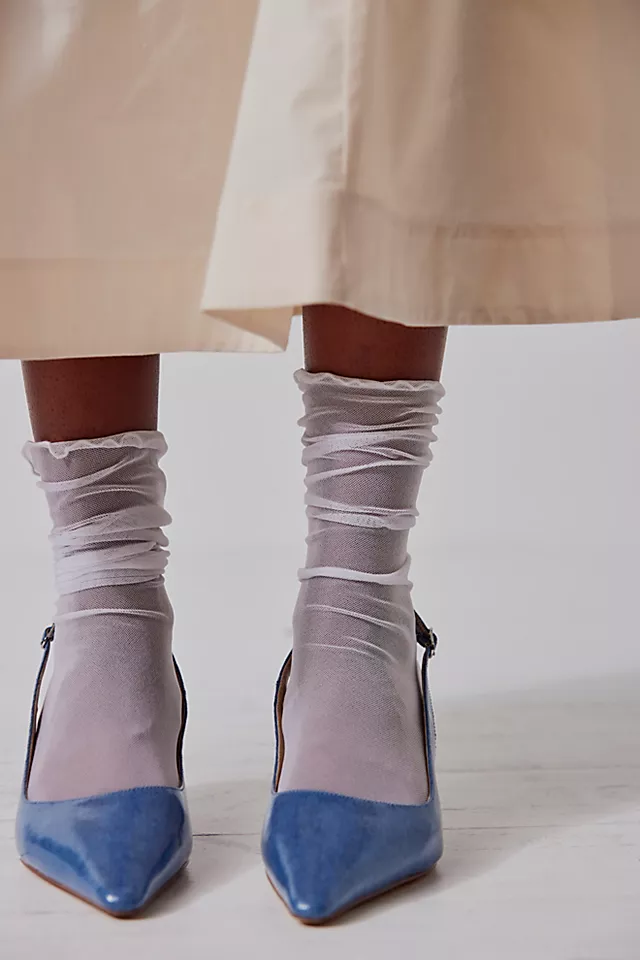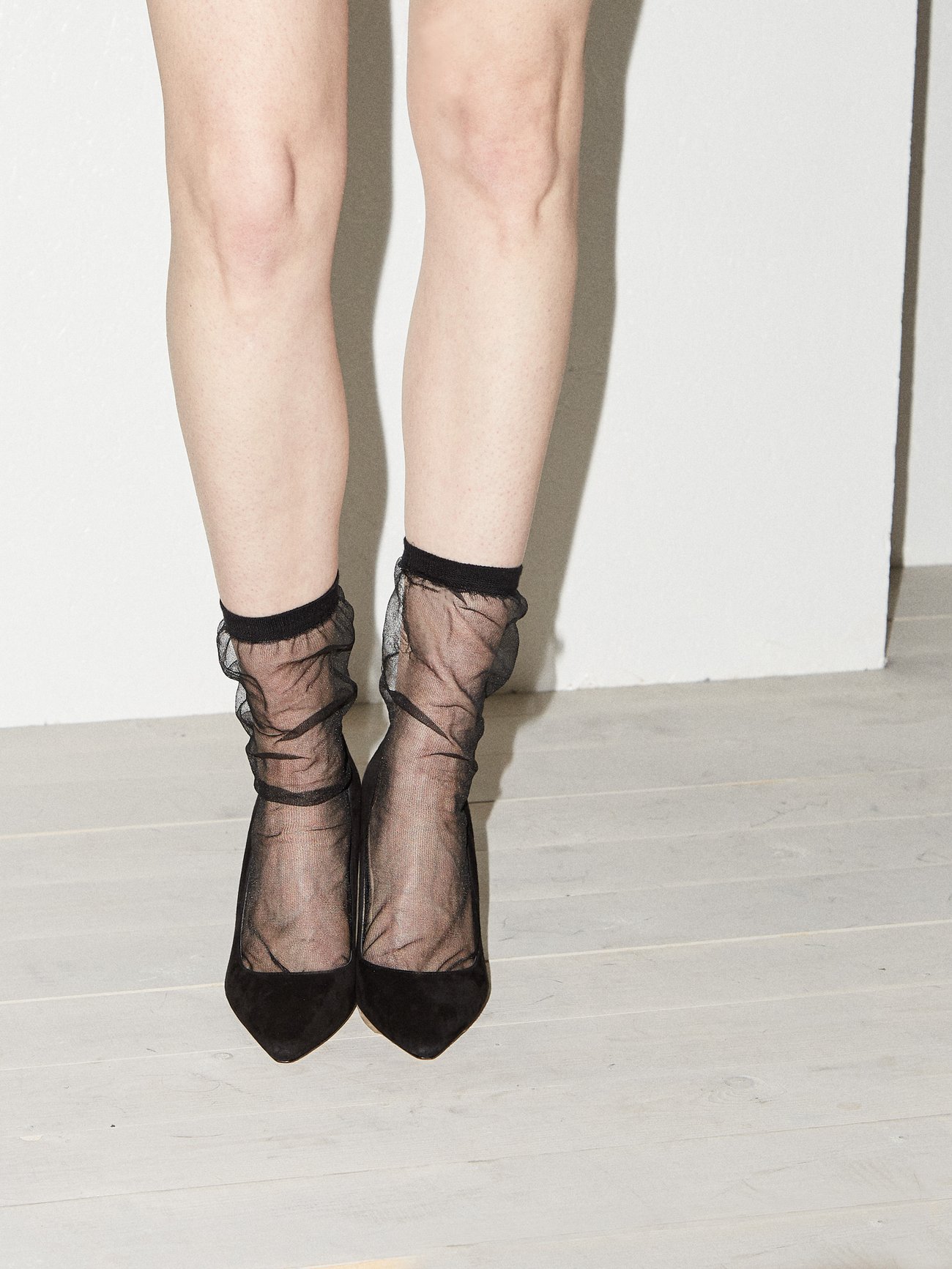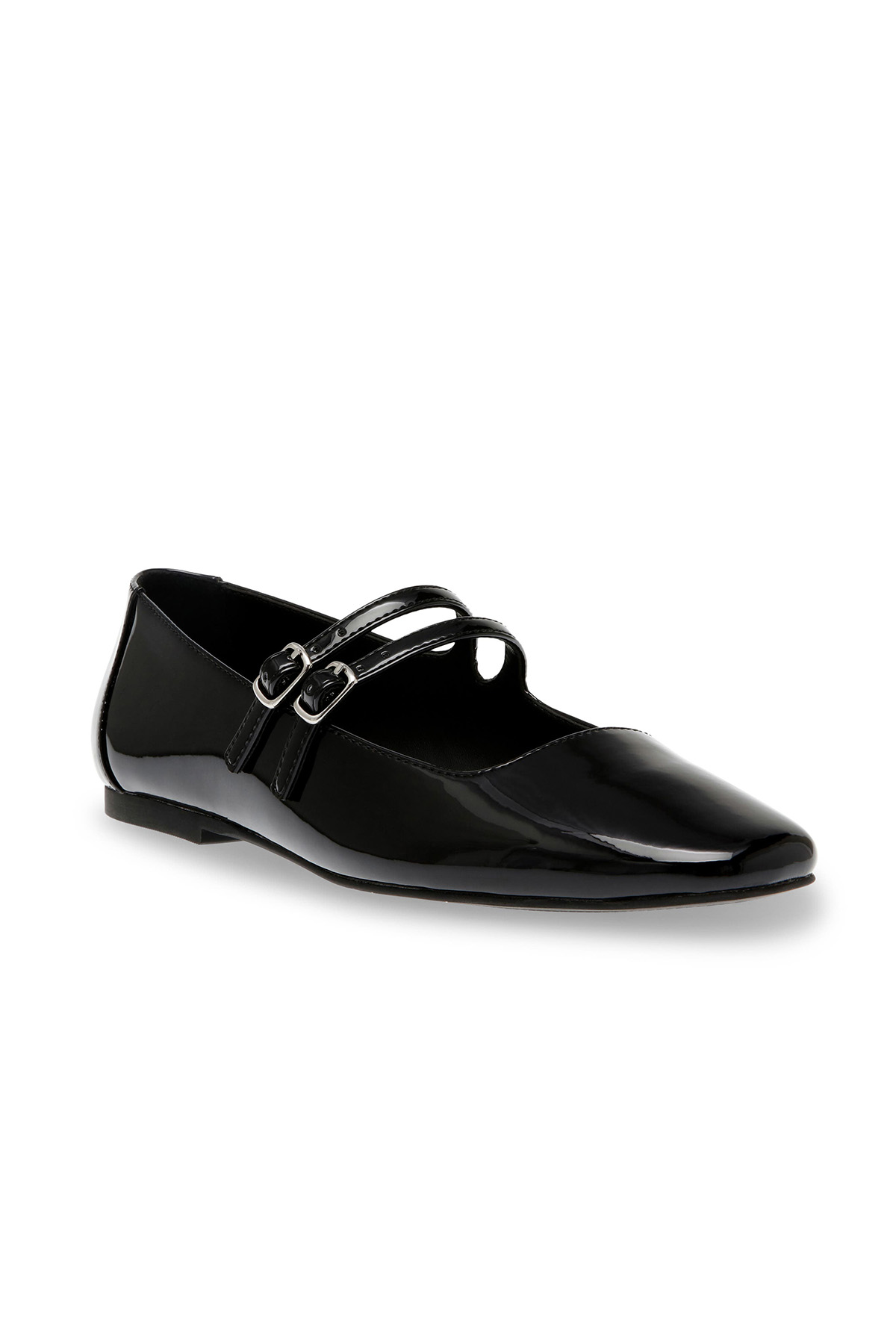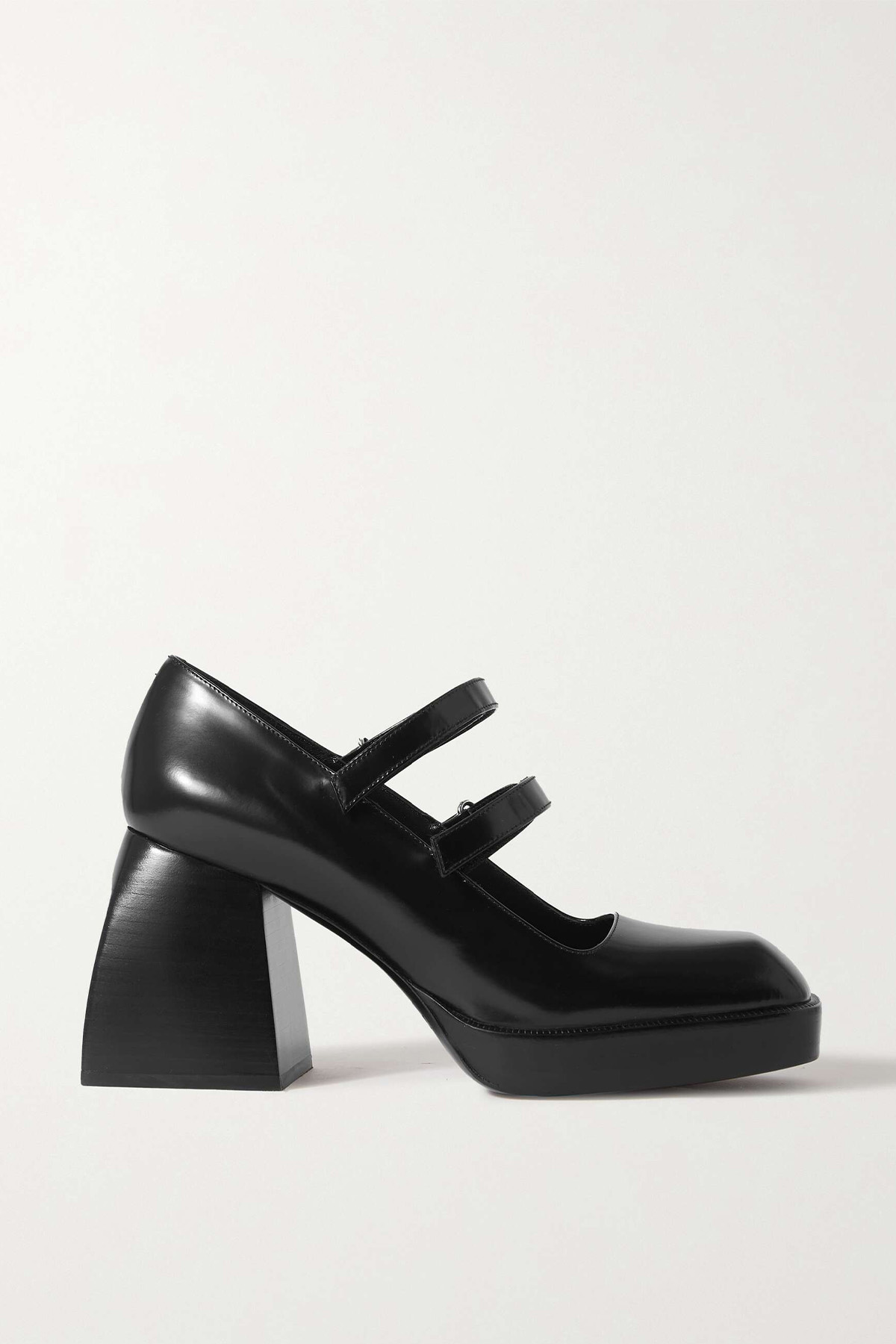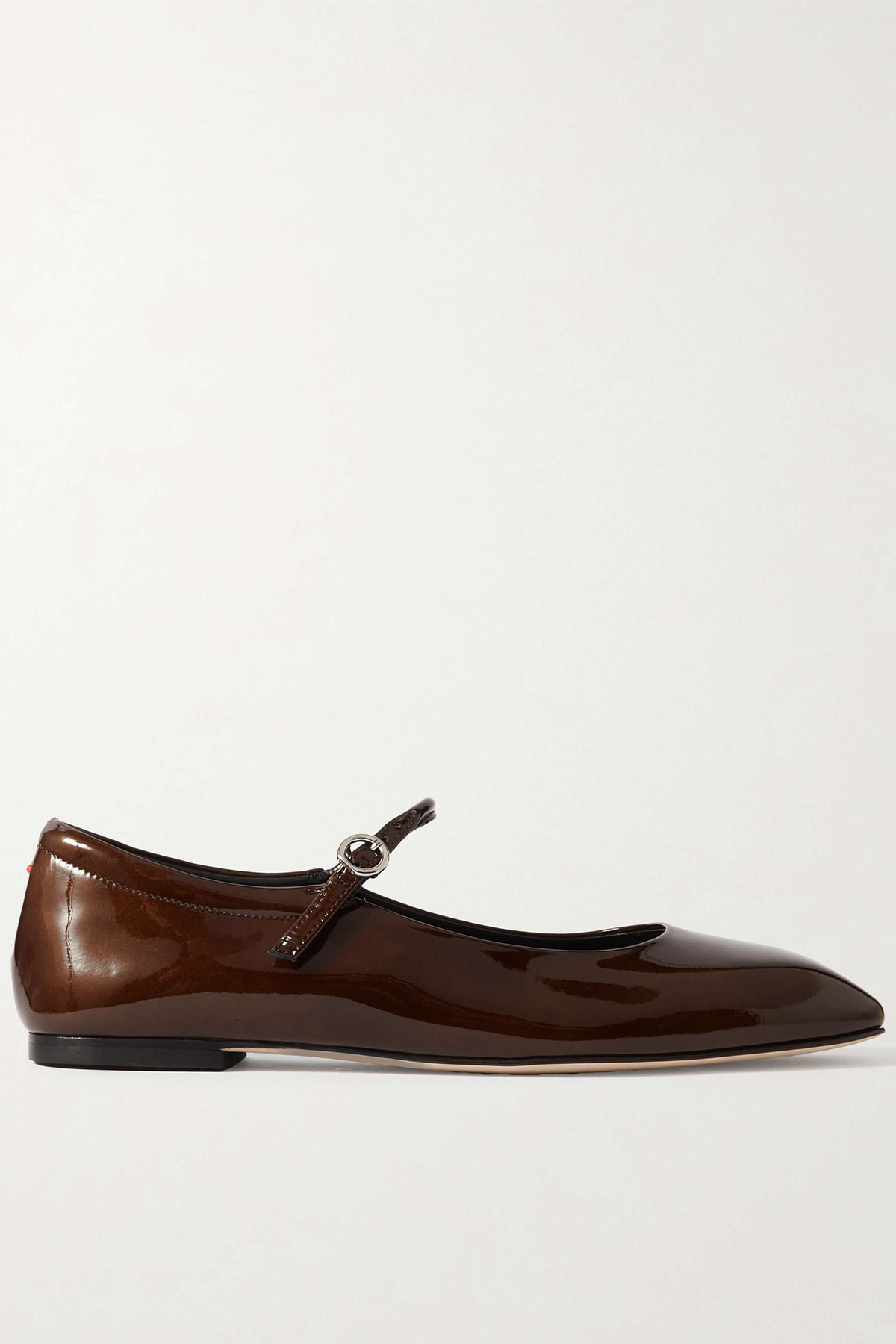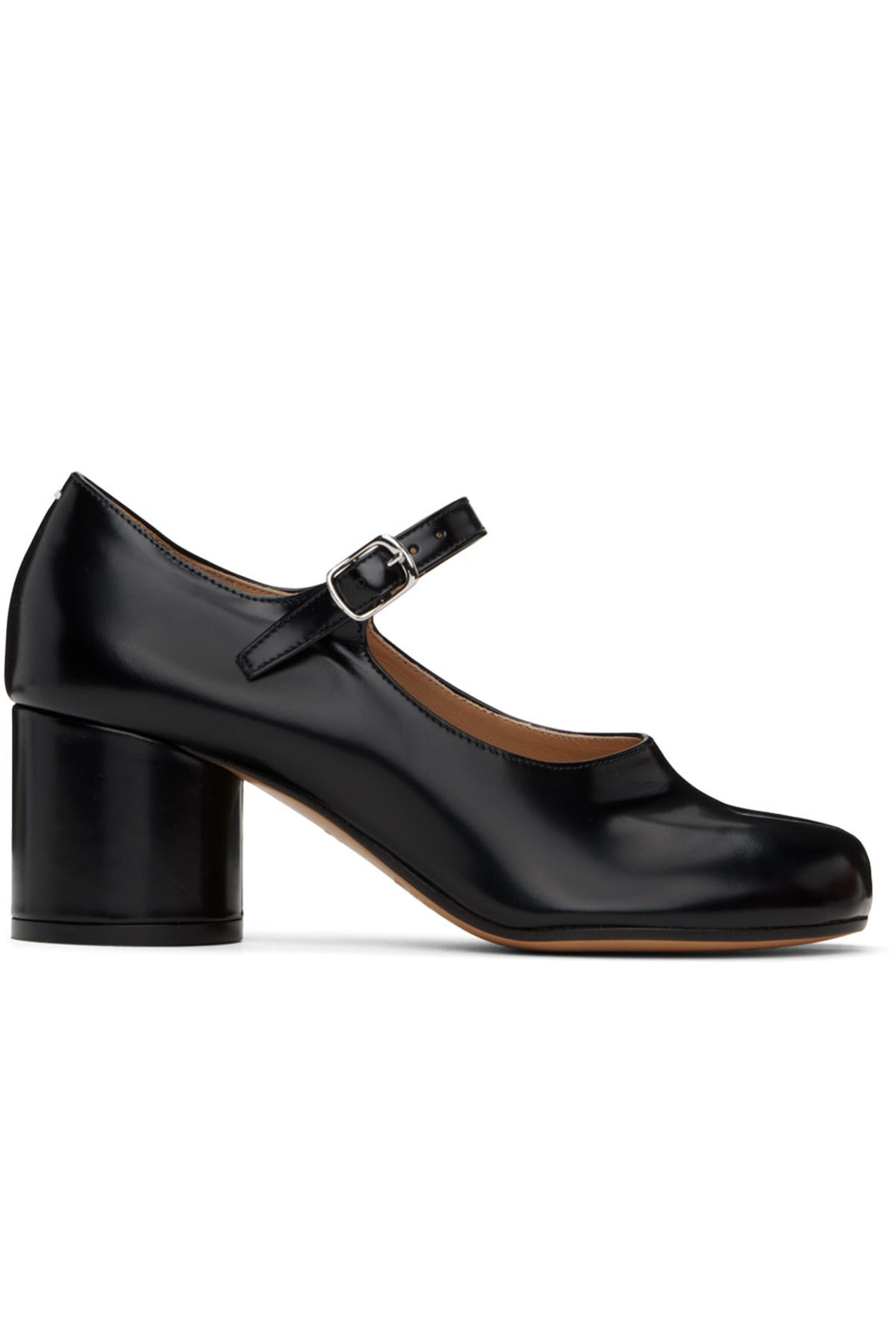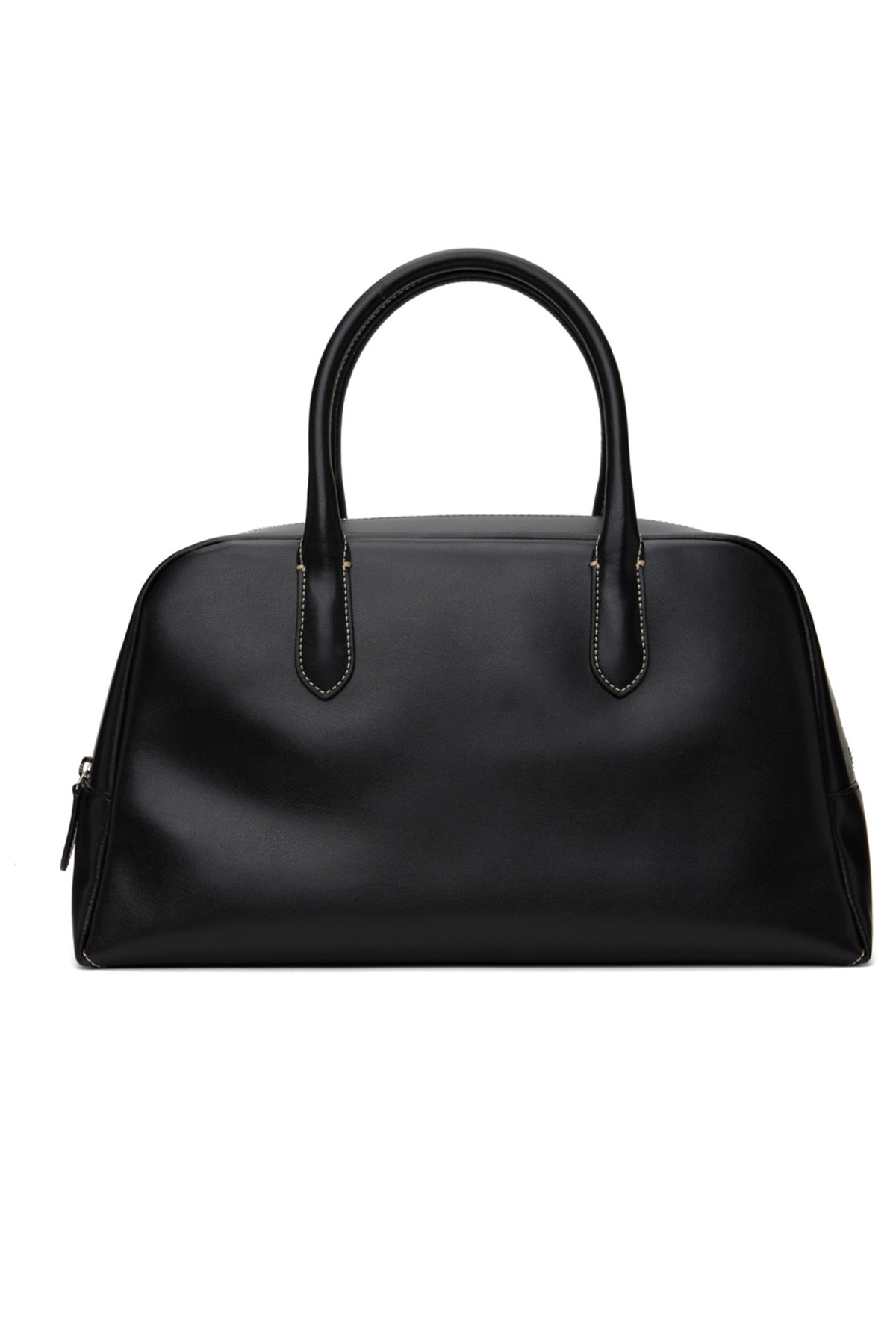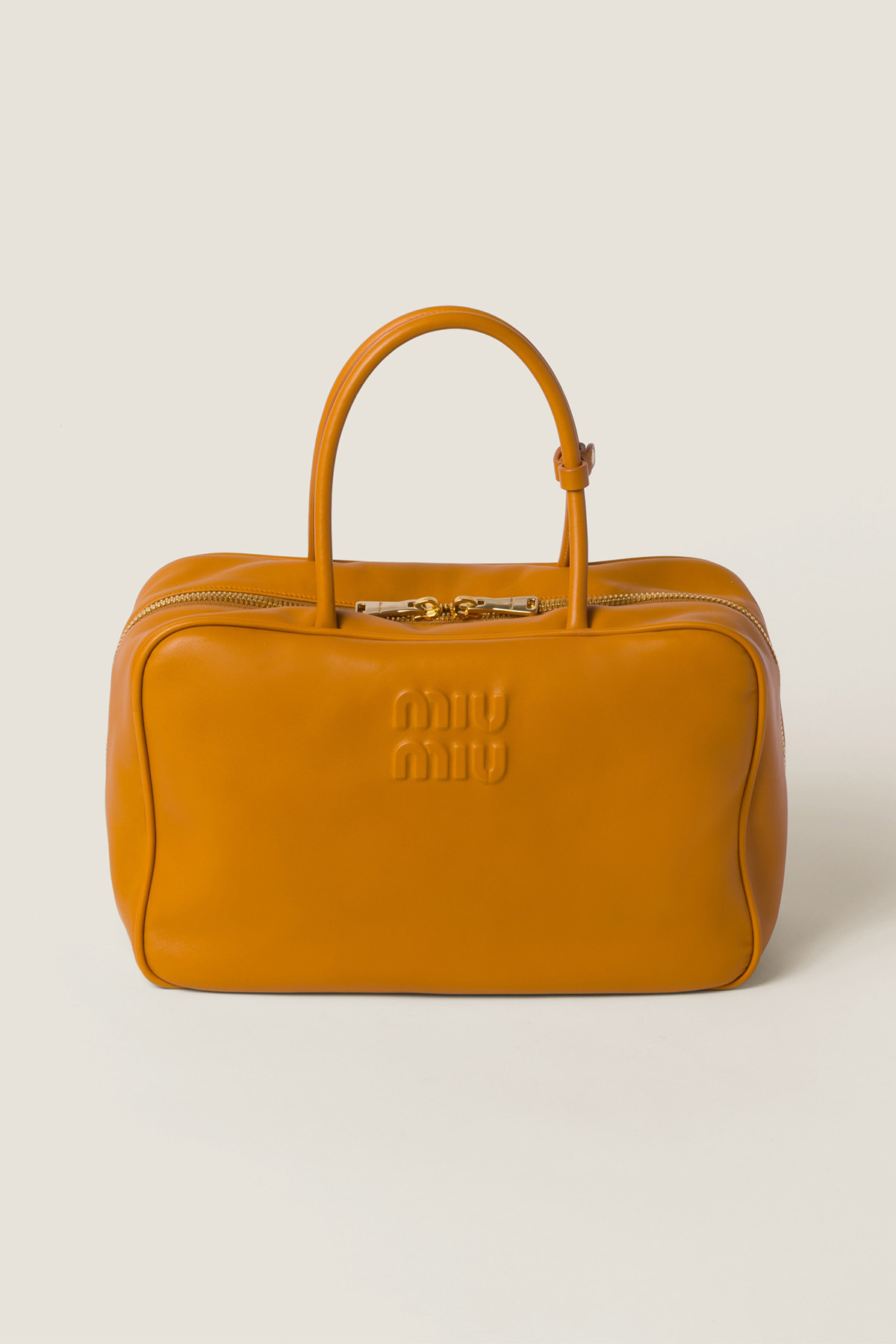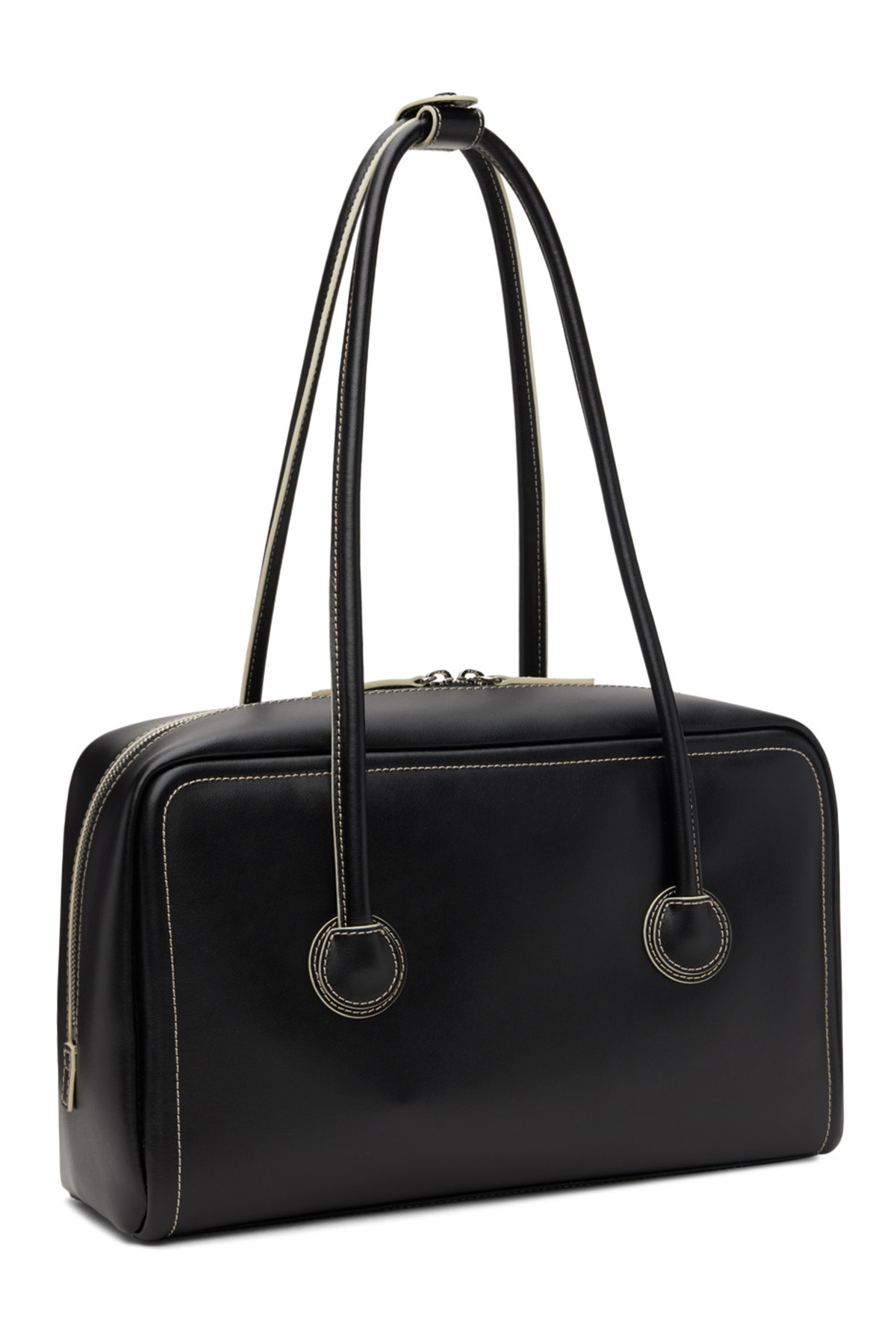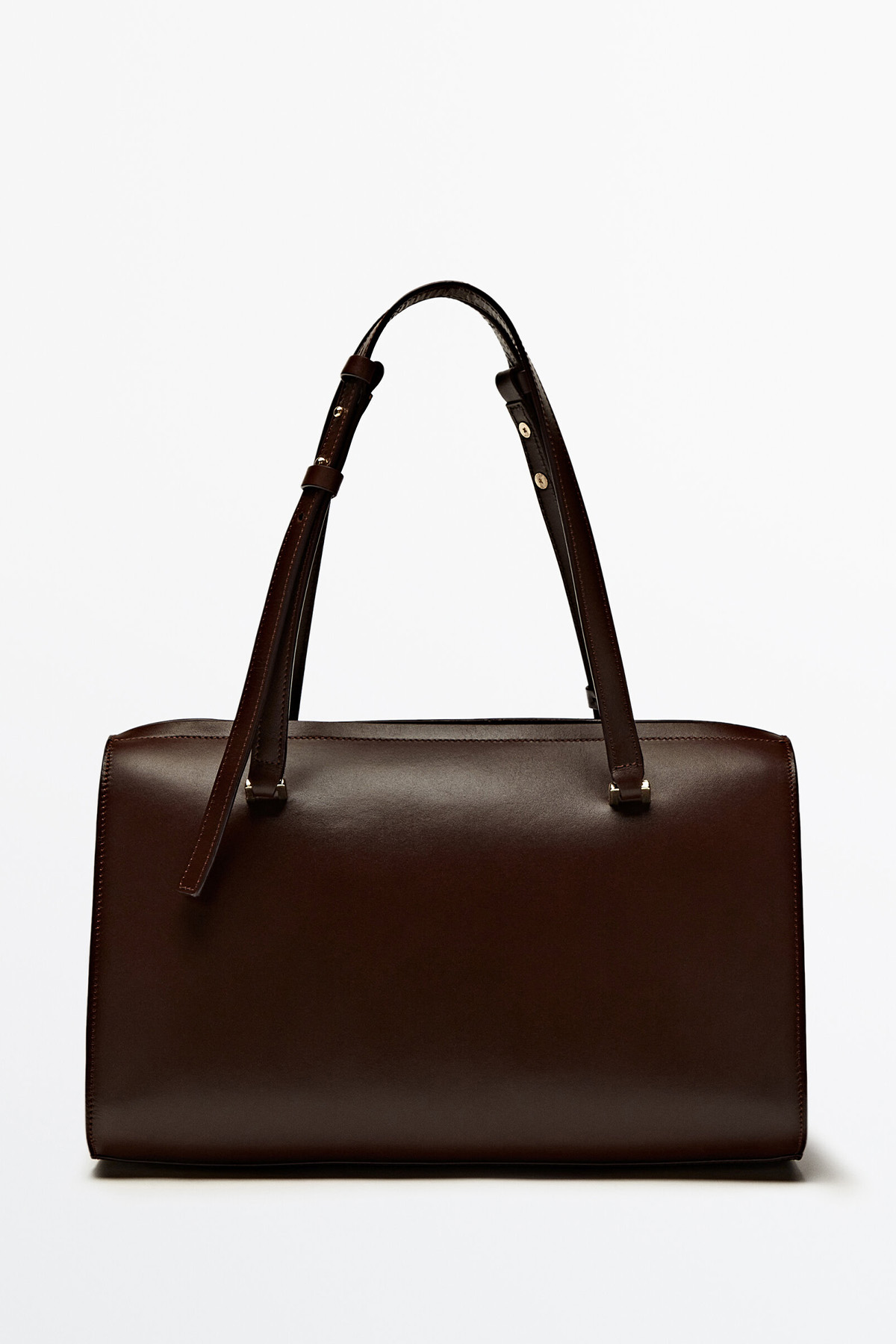Geek Chic! Librariancore! Why "Nerdy" Fashion Will Define 2024
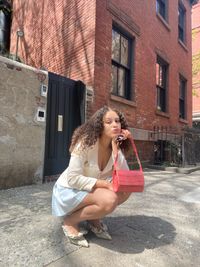
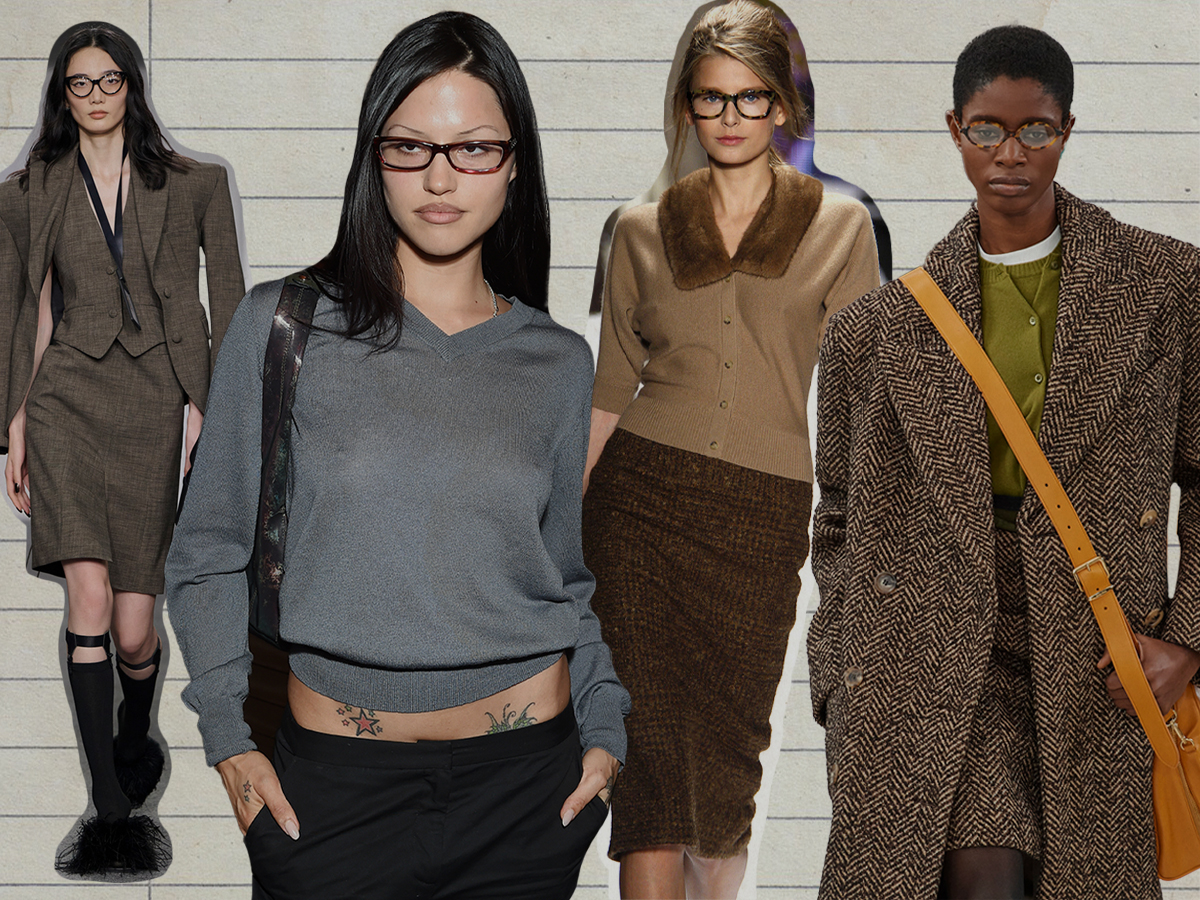
Picture this: You're curled up in bed, phone in hand, scrolling through social media. You know that it might behoove you to open that book, but let's be honest: TikTok is just too engrossing. Sure, maybe we're a bit overdependent on these platforms for entertainment. However, our hypothesis is that social media offers us a masterclass in the human psyche (if you're willing to read between the lines). After all, social media isn't just something we idly scroll through; it influences every aspect of modern life—from how the platforms have transformed the publishing industry to how we dress daily. It might seem like the impact TikTok has had on different sectors of industry and pop culture might be disparate, but it's all connected. The best example of that is the rise of a specific fashion aesthetic: geek chic, or what's also referred to as the librarian-core trend.
The mere notion of dressing like a "nerd" feels antithetical to the current state of fashion, in which the collective is obsessed with keeping up with what trends are deemed as "cool." (Refer to the rapid rise of the mob wife aesthetic or clean girl beauty as examples.) Contrary to other trends that feel like marketing gimmicks, the geek-chic fashion aesthetic has been deeply intertwined in the cultural zeitgeist for decades, if not longer. The concept of what nerds look like may have evolved from their early definitions in the '50s and '90s, but it's always been both a subversive and an ostracizing tool. With the latter, there's no shortage of historical examples in which the caricatures of geeks are touted in mainstream media to offer a distinct visual manifestation to reinforce ideas around who is considered "normal," "desirable," or even "important" in broader society.
But while it might be easy to limit the idea of the stereotypical nerd to an outcast, the truth is that this fashion aesthetic has often been a way for people who identify as women to challenge notions of traditional femininity. Dissimilar from other trends, in which the desire to project an image of perfection or tradition is the driving force—e.g., the old money aesthetic, which is about displaying a carefully curated image of wealth, or the tradwife movement, which is about exhibiting the "ideal" family life—geek chic is all about embracing what's antithetical to the mainstream. In a period in which it's easy to succumb to the pressures of adopting every micro-trend or the aspiration to curate an immaculate image on social media, this aesthetic offers women the opportunity to opt out of the illusion of perfection.
However, we'd argue that the reason this aesthetic is so alluring at this moment goes beyond the exhaustion contemporary society feels to curate their personal style perfectly; it intersects with the current state of the publishing industry and even politics. Don't believe us? Ahead, we're breaking down the origins of this fashion aesthetic, why geek-chic fashion has become relevant again, and the key pieces you'll need to adopt the look for yourself. Put on your reading glasses; it's time to get into it.
What Is Geek-Chic Fashion?
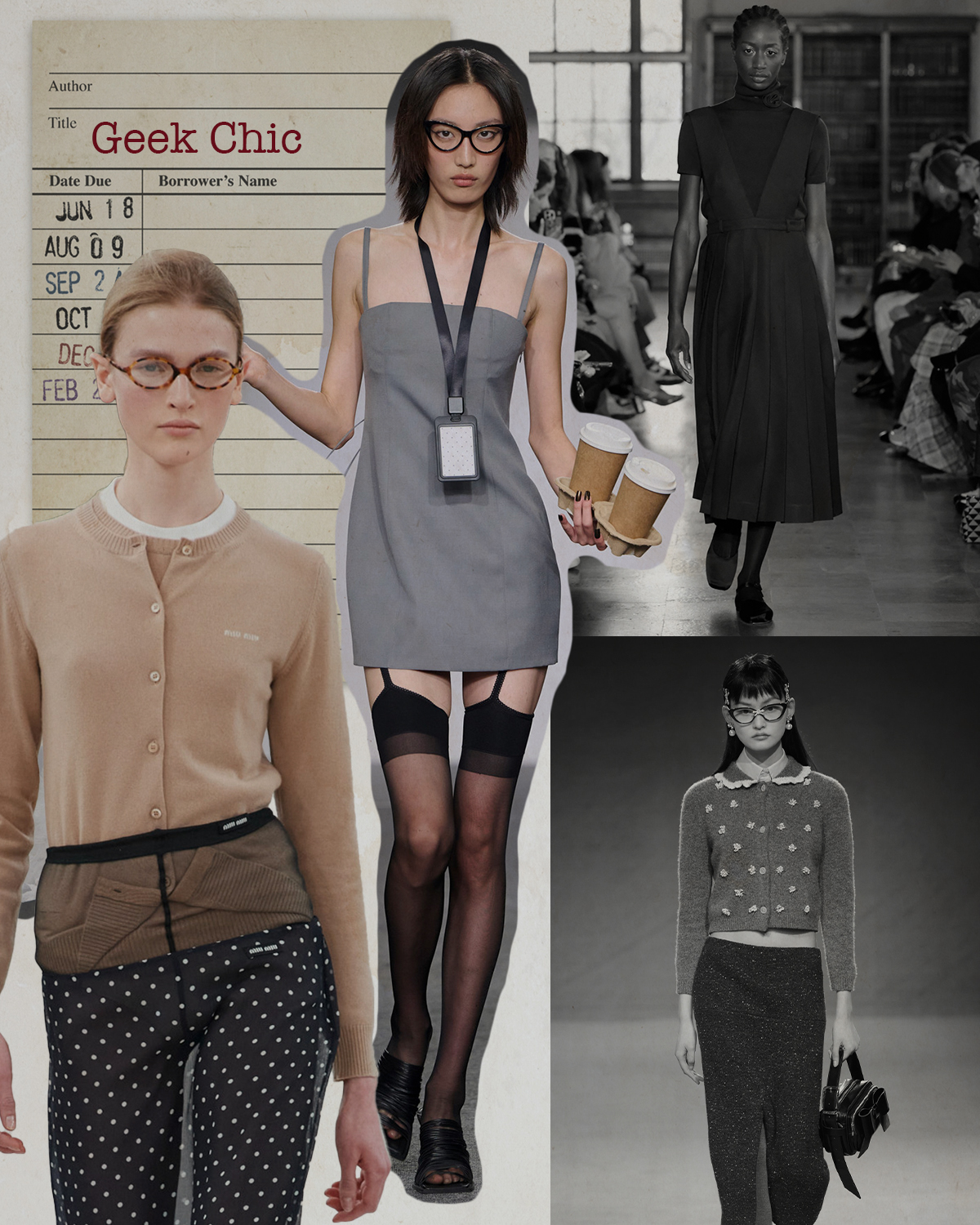
Allow us to nerd out by delving entirely into the historical archives for a minute. We can't give you more context into what characterizes the geek-chic or librarian-core fashion aesthetic without digging into the origins of the term nerd. Originating from slang in the 1950s, the definition was essentially synonymous with men who lacked social skills but were deemed intellectually superior, often displaying an outward obsession with science and tech. The label grew in popularity during the massive technological advances of the '60s onward. The typical attire associated with "dorks" were button-down shirts, bow ties, and high-waisted trousers. Still, that stereotypical image did not factor in all of the women whose existence in intellectual spaces was left out of history books.
Keep in mind that long before we had movies like Hidden Figures documenting Black women's contributions to the space race or even social posts satirizing the concept of women in STEM, the definition of what a "nerd" looked like was primarily associated with white men. That association wasn't limited to the STEM industry; it influenced other intellectual spaces, especially higher-education institutions. Until the Supreme Court ruled on Regents of the University of California v. Bakke in 1978, higher-education institutions failed to ensure equal admissions for women, much less communities of color. With that decision, we saw these academic spaces become more diverse, and the sartorial elements that define this group expanded too. Akin to other alt-fashion aesthetics, geek chic gave marginalized communities a way to subvert ideas around societal hierarchy that upheld gender roles and racism.
After the Second World War, a select class of women were forced back into the home, which set the stage for the inevitable second wave of feminism that would rebuke ideas around the nuclear family, women's role in society, and what they "should" wear—it led many to embrace "anti-feminine" or "dorky" attire in the '70s. That existed in tandem with the Civil Rights Movement, in which many members of the Black community used Ivy style, or what we'd refer to as geek chic, as a way to challenge notions of who was deemed respectable in that period. But it wasn't just during the '50s and '60s that we saw this aesthetic root itself in the cultural landscape. If you can recall, counterculture movements dominated the '90s up until the mid-aughts. That era popularized many alt-fashion aesthetics, including grunge, goth, and, of course, geek chic.
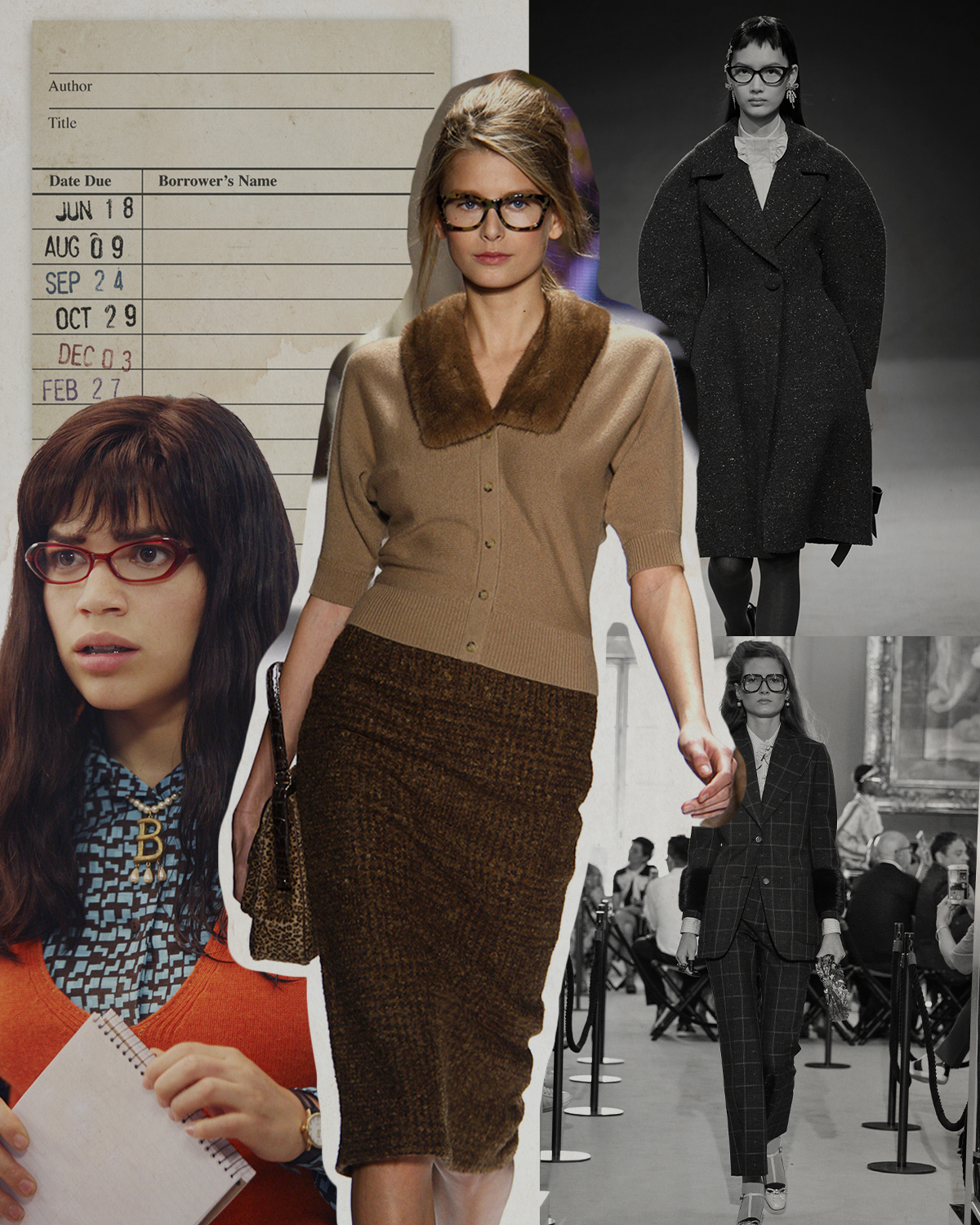
While some of the allure of this aesthetic's return in the '90s was, again, rooted in subverting what was "normal," this period marked the proliferation of nerd fashion. What contributed to transforming this formerly "unattractive" style into a trend, you ask? Its prevalence in the highest echelons of film and fashion. One could argue that the mother of fashion, Miuccia Prada, ushered in the shift herself with the debut of her S/S 96 collection entitled Banal Eccentricity, which featured work staples like button-down shirts, pencil skirts, and blazers in quirky '70s-inspired prints in unorthodox color pairings. From that moment on, we saw various designers embrace the aesthetic, including Michael Kors, Ralph Lauren, and Marc Jacobs.
Like clockwork, after the adoption of the trend on the runway, it took over our screens, giving us the first wave of female geeks reflected in characters like Laney Boggs from She's All That, Miss Honey in Matilda, and Kat Stratford from 10 Things I Hate About You. While films and fashion from the '90s no doubt began to redefine what geek-chic fashion was, it was not until the mid-aughts to early teens that this aesthetic became, well, cool. You can cite this shift in the gradual evolution of nerdy female protagonists on-screen from being off-putting or socially inept to suddenly finding their way into the popular crowd. For example, we saw the debut of two now-legendary characters in 2006, the first being Andrea Sachs in The Devil Wears Prada. The entire film traces her journey from being a caricature of dorkiness in her cerulean frumpy sweater that she "no doubt … fished out of some clearance bin" to becoming the embodiment of geek chic.
Similarly, that year, we saw the release of the popular television series Ugly Betty, which followed the life of the protagonist (Betty Suarez) as she navigated working at a fashion magazine while wearing clothing you'd imagine a librarian wearing—e.g., clashing-print ensembles featuring ill-fitted cardigans, frilly skirts, and prominent eyewear. Each project flipped the script on the idea of nerds being antithetical to high fashion because of their proximity to the industry itself. Ultimately, though, what cemented this aesthetic into the cultural canon cannot be solely attributed to the dorky on-screen protagonists but to the purveyors of style themselves: fashion designers.
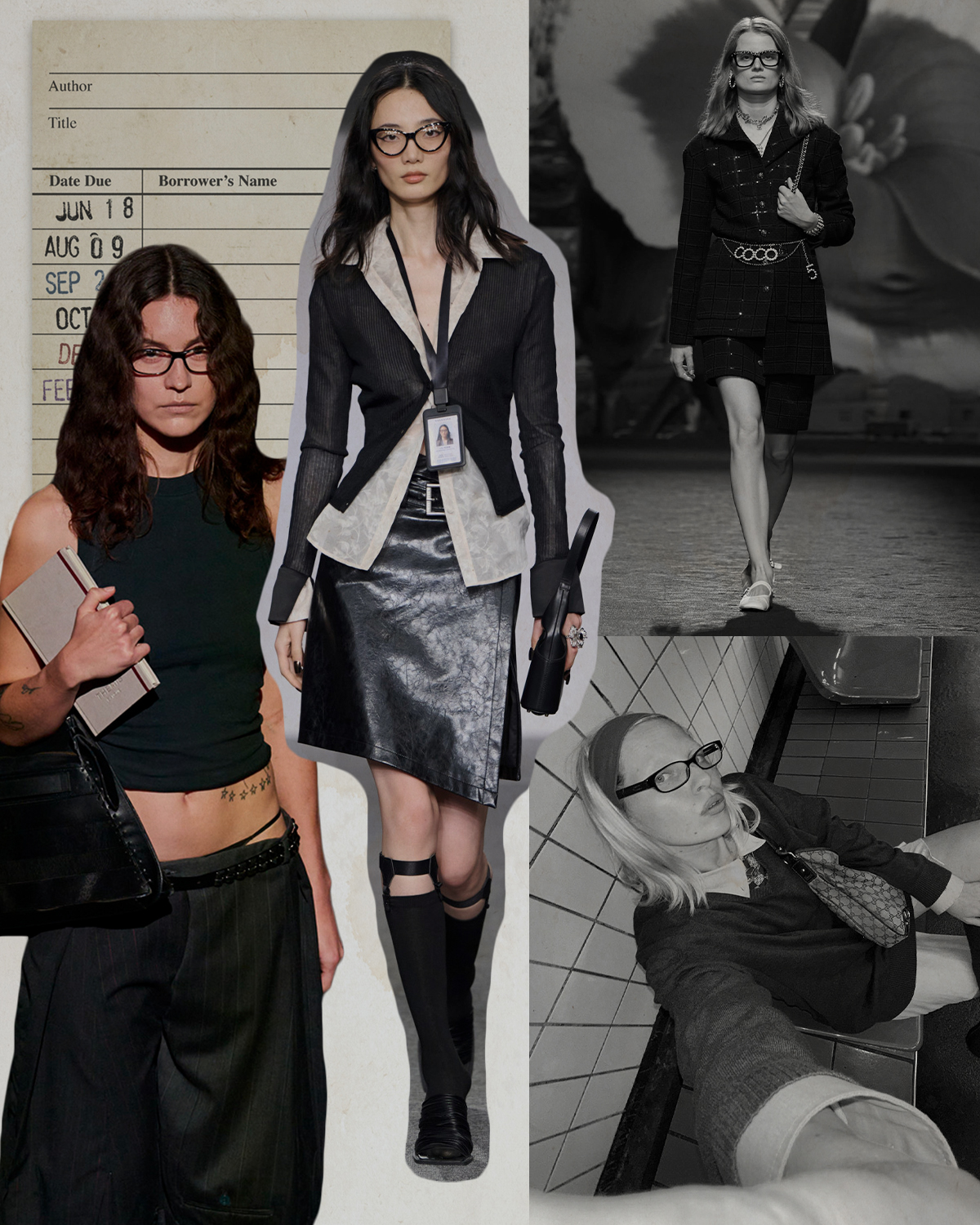
You must remember that the archetypal nerd style was derivative of the negative associations with this community for years. It wasn't until designers like Miuccia Prada and Alessandro Michele (the former creative director at Gucci) came along that this countercultural movement was made chic by incorporating it into collections. The most recent wave of this trend was ushered in, most notably by Michele's first few Gucci collections that debuted from 2016 onward. His was a quirky and often maximalist take on staples pivotal to geek culture—e.g., oversize glasses, pussy-bow blouses, cardigans covered in logos, and tailored trousers in kitschy prints.
In many ways, the collections captured what was happening in the broader culture, in which the subconscious desire for that generation to decenter the heteronormative male gaze manifested itself through wearing "ugly" clothing. Remember that the most recent revival of geek chic coincided with a contentious presidential election, the growing traction of the #MeToo movement, and the boon of fashion blogs like Man Repeller. It might sound trite, but being able to embrace "ugly" clothing allowed people to define beauty on their own terms in a time of uncertainty. Although the world is vastly different now, the appeal of this fashion aesthetic remains unchanged.
One could argue that dressing like a dork has never been more popular. A few elements have contributed to its comeback—the first being the current political landscape. While a few fashion brands have, no doubt, made being a part of the pack of nerds posh again, ultimately, the younger generation's desire to express their opposition to recent Supreme Court rulings and proposed legislation to ban books across the United States could be at play. While it might seem semi-ironic that the idea of dressing like a librarian would be trending at a time when there's a push to curtail funding for libraries because of local libraries' refusal to limit free speech, it's not. Trends (of all kinds) can reflect the times.
You can draw that conclusion by referring to how social media platforms make being a bookworm popular again despite calls to ban books from marginalized communities. The rise of BookTok on TikTok, in which users talk about literature—there's every type of discussion to be found from the buzz around new novels to the concept of bookshelf wealth—has revitalized the publishing industry. It might seem obscure, but all of these smaller movements have ushered in the next page in the geek era—one in which the desire to look like a nerd is manifested through a carefully curated reading list and capsule wardrobe. But what exactly will this new era of nerdy fashion entail? Keep reading; we've got the footnotes for you ahead.
How to Adopt the Geek-Chic Aesthetic
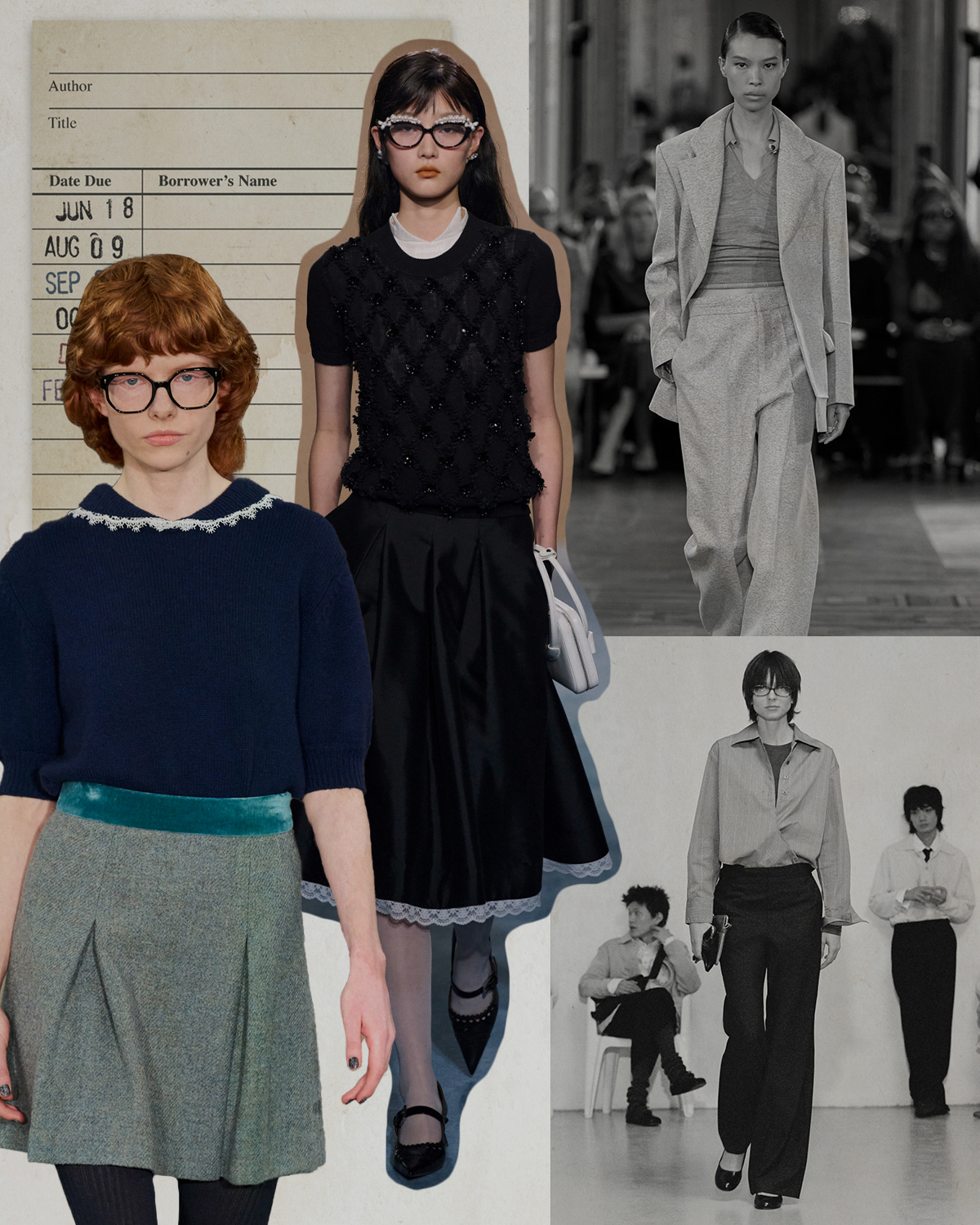
When defining this era of geek chic, there are a few things to remember. First, a significant part of the overall aesthetic is about wearing nerdy fashion, which manifests through specific colors, textiles, and silhouettes. Although previous iterations of geek-core were maximalist in nature, modern versions are far more austere. We've seen this approach from luxury houses such as Miu Miu, Chanel, and Victoria Beckham to rising labels such as ShuShu/Tong, Hodakova, and Markgong. The modern version of nerdy fashion feels adjacent to the rise of the office siren trend, which is very much rooted in embracing one's soft power through style. The main difference between the two is that the office siren look feels more like an embrace of hyper-sexuality as a way of rebellion.
In contrast, geek-chic fashion is about subverting notions of sexuality through pieces that are pseudo-intelligent. Nevertheless, Markgong's S/S 24 collection seemed to tap the spectrum of both of those trends. Models came down the runway with coffee, dry-cleaning, and office badges in tow, while wearing workwear that walked the line between nerdy and sultry. It was indicative of how far removed the definition of geek chic has become from the previous connotations of dorks having bad taste. The look is now refined with a series of staples that have silhouettes that feel like they could be a part of a librarian's uniform—e.g., skirts with hemlines that always cover knees, blouses that fit loosely, high-waisted trousers, and crewneck knits with high necklines.
Additionally, the contemporary take was far more pared-back compared to previous versions of the geek-chic trend, which relied on heavy print-clashing and unexpected color pairings. Across fall 2023 and spring 2024 runways, librarian-inspired fashion came in a muted color palette of black, white, navy, gray, and brown. Any prints incorporated were a bit more elevated, such as plaid, pinstripes, or polka dots. Furthermore, when it came to textiles, we saw designers embrace more pragmatic materials like wool, cashmere, and cotton. That's not to say there weren't elements of surprise and delight, as some designers chose to use lace and sheer textiles to add a more "feminine" touch to the otherwise androgynous basics. (Refer to ShuShu/Tong's S/S 24 or Paul Joe's F/W 23 collections).
But overall, the variations of this trend we're seeing on the runway are far more utilitarian in nature, allowing more people to embrace their inner geek on their own terms. Ultimately, the fashion aesthetic's ever-evolving definition has made it continuously alluring throughout the years. In a world in which what's deemed important (from books to fashion trends) is determined by powerful insiders, geek chic allows us to reclaim our power from the margins. Although the trend can liberate us from the limitations of beauty standards, a few key pieces feel succinct to this particular aesthetic. Keep scrolling to see what they are.
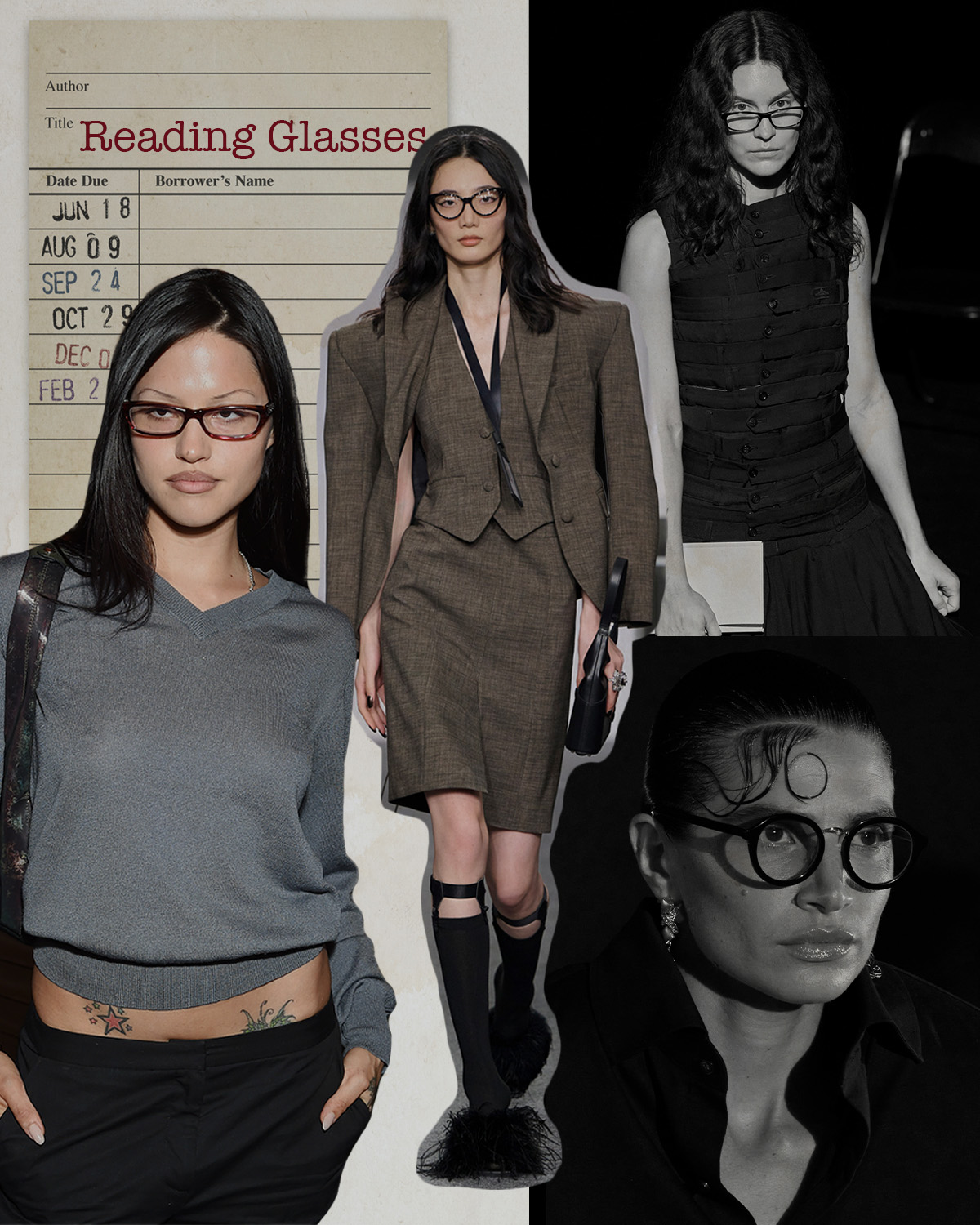
You can't talk about geek fashion without naming the accessory that has long been the cultural signifier of being a nerd: reading glasses. Like it or not, throughout the years, the cliché depictions of geeks in pop culture always included some prescription eyewear. But let us make it clear: Glasses are hot, okay! We've seen this formerly dowdy accessory donned by conventionally attractive nerds in recent years. The first example of this shift can be found on-screen in the character Serena in The Devil Wears Prada. Played by supermodel Gisele Bündchen, the editor embodied geek chic, wearing her black Bayonetta eyewear and formfitting workwear. One could argue that this fictional character opened up the floodgates for thin glasses to reign supreme in the aughts.
But beyond fictional characters, its present-day revival can be attributed to its prevalence on and off the runway. We've seen every type of eyewear frame imaginable resurface—from oversize round glasses to traditional cat-eye lenses to petite oval frames—in the collections of some of the coolest brands, such as Luar and Miu Miu. But with modern-day style icons such as Bella Hadid, Emma Chamberlain, and Gabbriette Bechtel wearing thin reading glasses, it's proven once and for all just how posh the accessory can be.
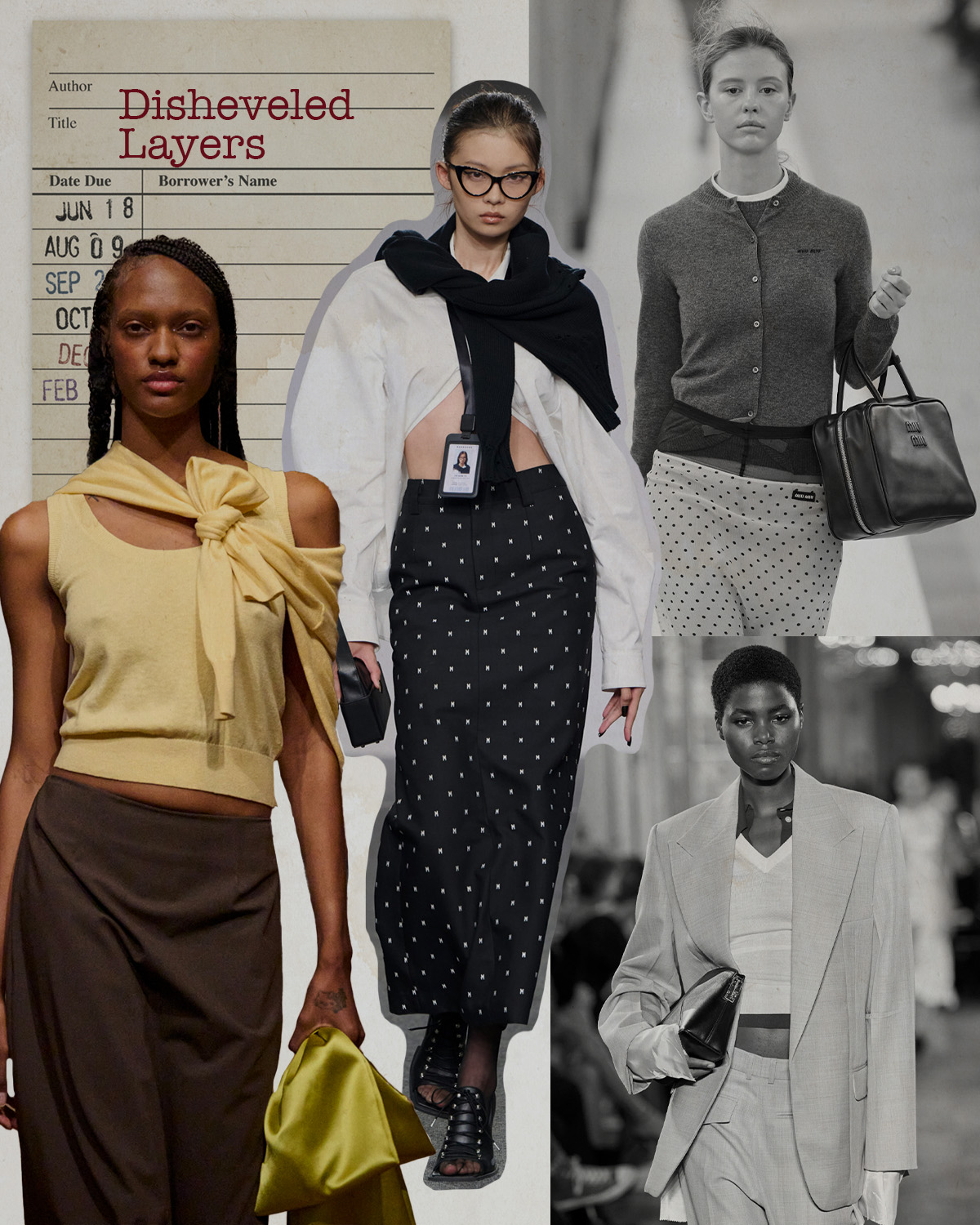
The second step in embracing the geek-chic fashion aesthetic lies in leaning into the preconceived notions that geeks have an overall "disheveled" approach to dressing. While we don't like to stereotype, this is one of the only elements of the trend that feel essential to it, especially when you consider that the rise of social media has built a cultural obsession with presenting an illusion of "perfection," but the geek-chic aesthetic is the antithesis of that. It's not supposed to be cool, calm, or collected; it's chaotic. It's about embracing intentional messiness, an idea that's been fully embodied in recent runway collections.
For example, at Miu Miu's F/W 23 show, cardigans were double-layered over T-shirts tucked into exposed tights with frizzy hair. Similarly, sweaters swung haphazardly around the shoulders at Sandy Liang's and Markgong's S/S 24 shows. At Victoria Beckham, semi-sheer T-shirts were layered on top of cropped button-down shirts. The overall aim was to create the feeling of someone who had all of these "polished" staples but threw them on so quickly that it resembled the charming yet chaotic energy of an elementary school librarian.
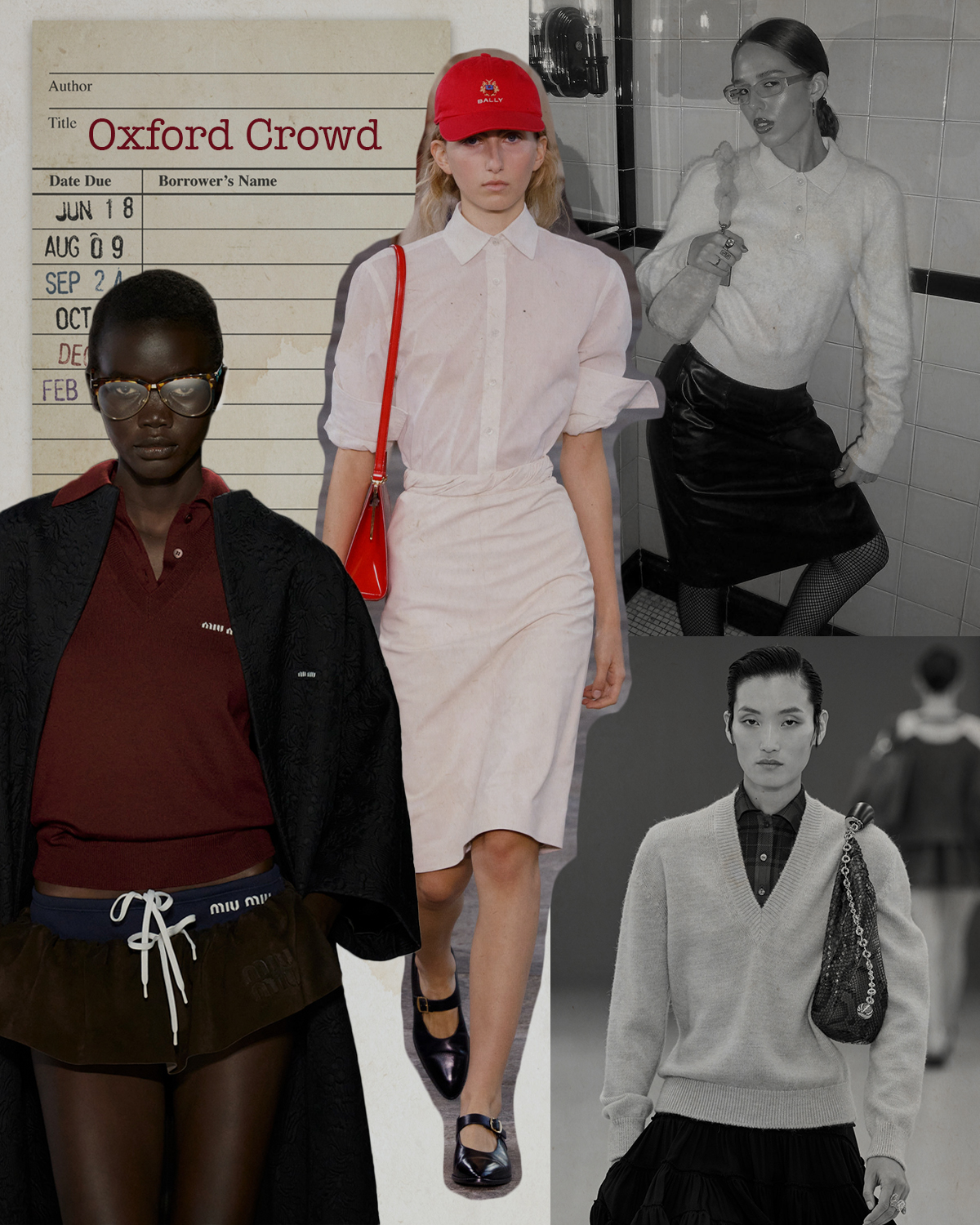
Since so much of the geek-chic aesthetic has been tied to spaces of academia, it's only fitting that one of the key staples would be Oxford button-downs and polo shirts. After all, the tropes associated with nerds were often those who displayed an unparalleled enthusiasm for higher education. But what makes this staple a bit more style-conscious than some of the previous preppy aesthetics is how it's styled in a "cooler" way.
For instance, in Miu Miu's S/S 24 collection, logo-embroidered polos were paired with contrasting micro-shorts. Similarly, we saw a white shirt and baseball cap elevated in Bally's spring show by being styled with a pencil skirt, frame bag, and Mary Jane flats. And then, there was Loewe's show, which made a plaid button-down a bit more polished when paired with a V-neck sweater and Squeeze bag. Ultimately, these minor styling tweaks allow the staple to nod to the Oxford crowd without getting caught up in maintaining clichés.
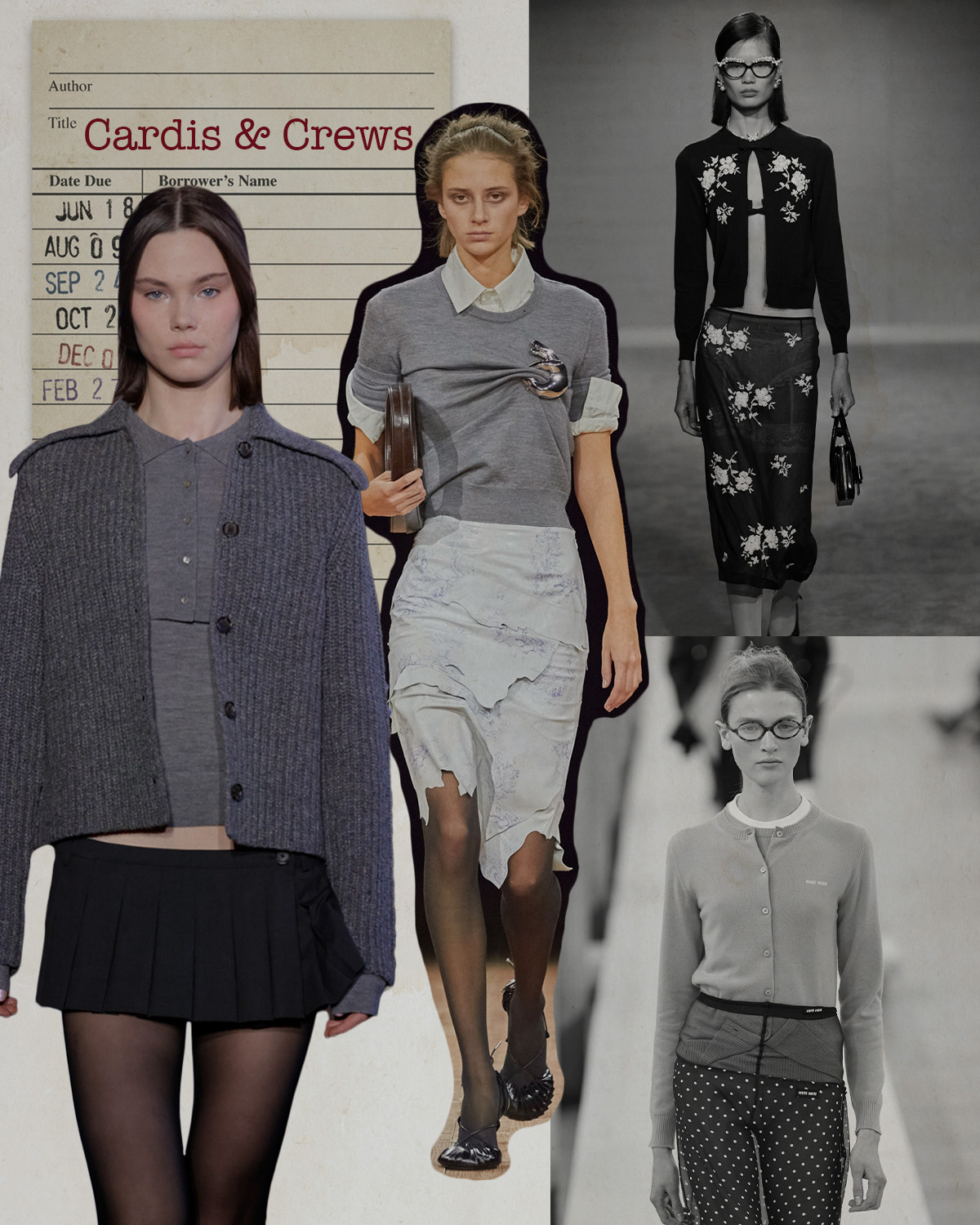
In addition to preppy shirting that feels academia adjacent, knitwear is also synonymous with geek-chic fashion. More specifically, cardigans and crewneck sweaters have long been the go-to items for crafting a look that screams, "I spend all my free time in the library." The association of these two knitwear silhouettes can not only be traced to famous characters in television and film, such as Jessica Day in New Girl or Hermione Granger in Harry Potter. But over the years, as designers have reinvented the aesthetic, they've simultaneously given a new life to the knitted staples through creative styling.
Again, we can reference Miu Miu's F/W 23 collection, in which crewneck cardigans were messily layered over each other to give off peak disheveled-librarian energy. Or there are the cheekier examples, including an embroidered granny-inspired cardigan layered over a bra top with a matching sheer skirt at ShuShu/Tong's spring show and a gray crewneck sweater layered over a button-down shirt with an oversize brooch in Coperni's F/W 23 collection. Then, of course, there were the more approachable versions of the knitwear reflected in Sandy Liang's fall collection. Cardigans with dramatic collars were layered over polo shirts and paired with pleated miniskirts—the ideal melding of geek-adjacent items with "pretty" items that have been trending. The overall result was a series of looks that served as a reminder that staples can be cool if you're clever enough.
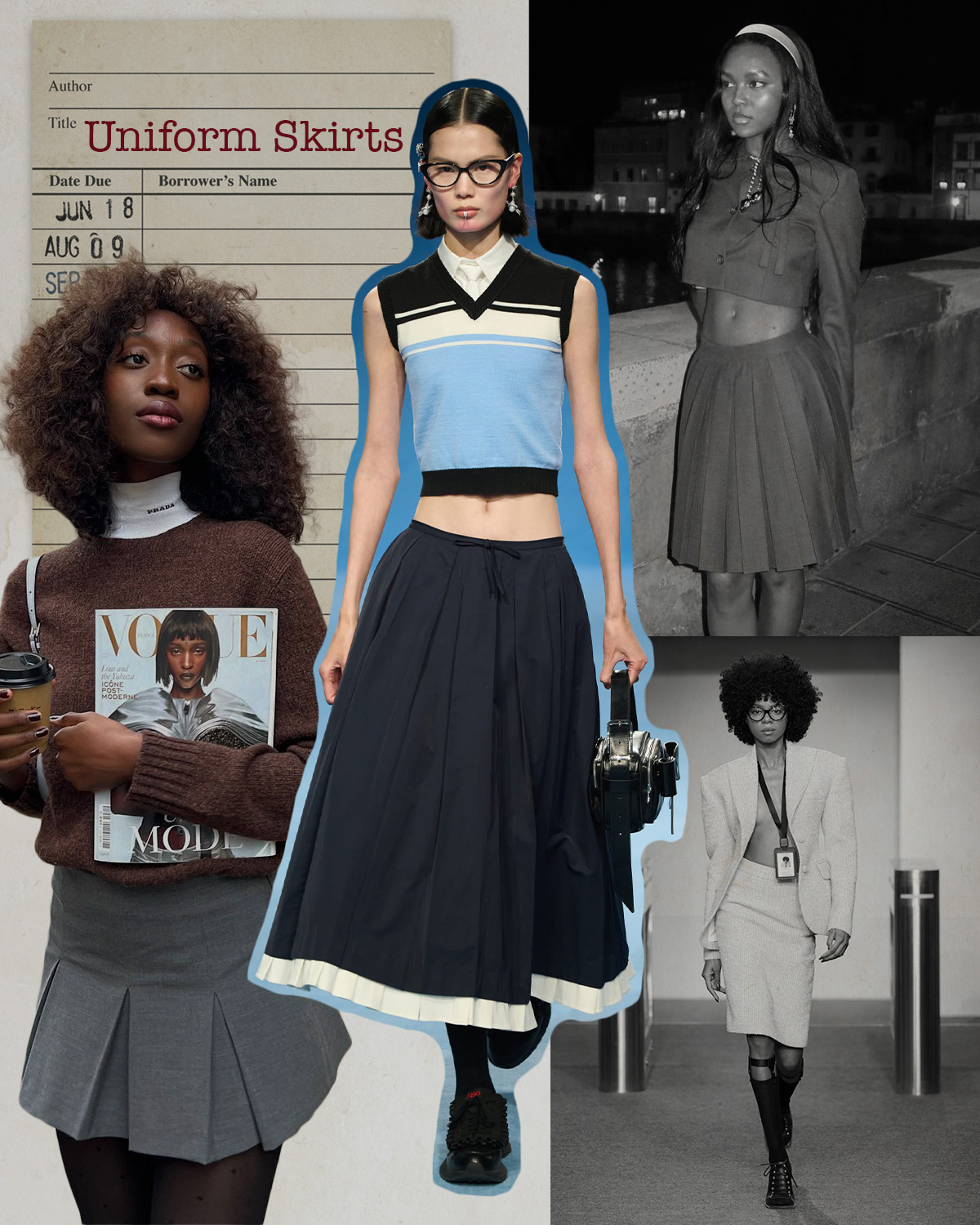
While we're not for judging a book by its cover, we can tell you without a doubt that certain things will always be associated with the outward appearance of geek-chic fashion. A prime example? The staple we're dubbing the uniform skirt, aka silhouettes that feature pleats or a tailored pencil cut. It doesn't take a genius to realize that the iconography surrounding nerds in contemporary entertainment often features characters wearing tailored skirts that feel like they're part of a school uniform—e.g., Mia Thermopolis in The Princess Diaries or Rory Gilmore in Gilmore Girls.
It has become synonymous with geeky protagonists everywhere. Although the standard version of this skirt comes in tartan-print iterations, it's become so synonymous with geeky fashion that it's grown from feeling like a part of a school uniform to coming in more elevated textiles, colors, and patterns. While our ideas around geek fashion are ever-evolving, this skirt continues to be a source of uniformity in the overall aesthetic.
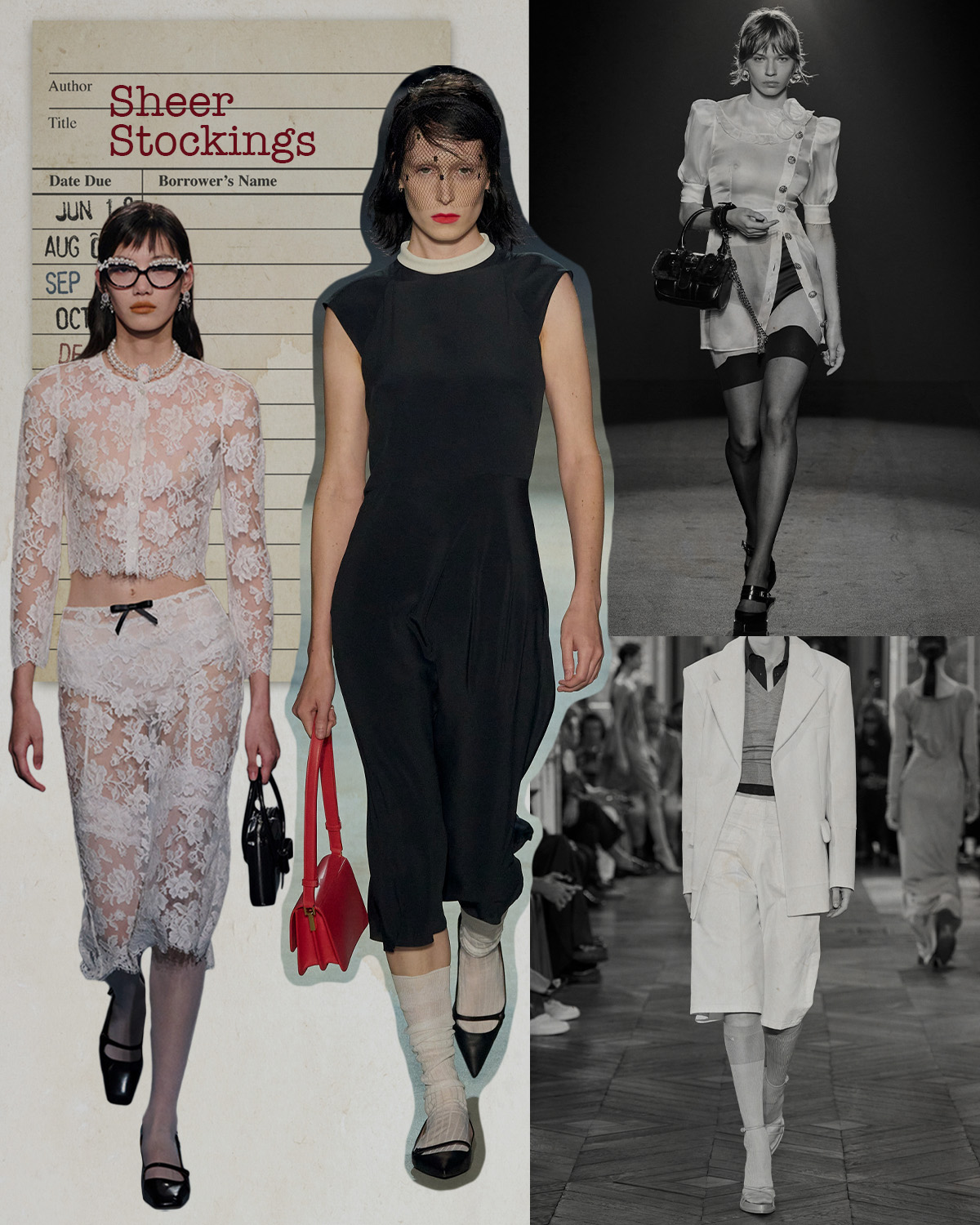
Not to take a leaf out of the book that built much of the eclectic grandpa trend, but adopting the geek-chic look requires incorporating some elements that feel dorky. Insert stockings into the conversation. If you were to imagine the archetypal librarian, nine times out of 10, you're going to picture them in long socks—it's just part of the look. Luckily, designers in recent seasons have elevated this underpinning by playing with opacity and styling. Not only were there more instances of sheer socks made from tulle and mesh in collections, but they were added to almost subvert preconceived notions around geek fashion not being provocative.
For example, already-sultry items like sheer blouses and lace pencil skirts were styled with sheer knee-high stockings at Alessandra Rich and ShuShu/Tong to dial up the drama. If they weren't already making hot items even hotter, they did so for those dorkier items—e.g., tailored shorts at Victoria Beckham were paired with sheer knee-high stockings and pencil skirts at Givenchy—proving once and for all that the well-read grandmas were right about the importance of a great pair of socks!
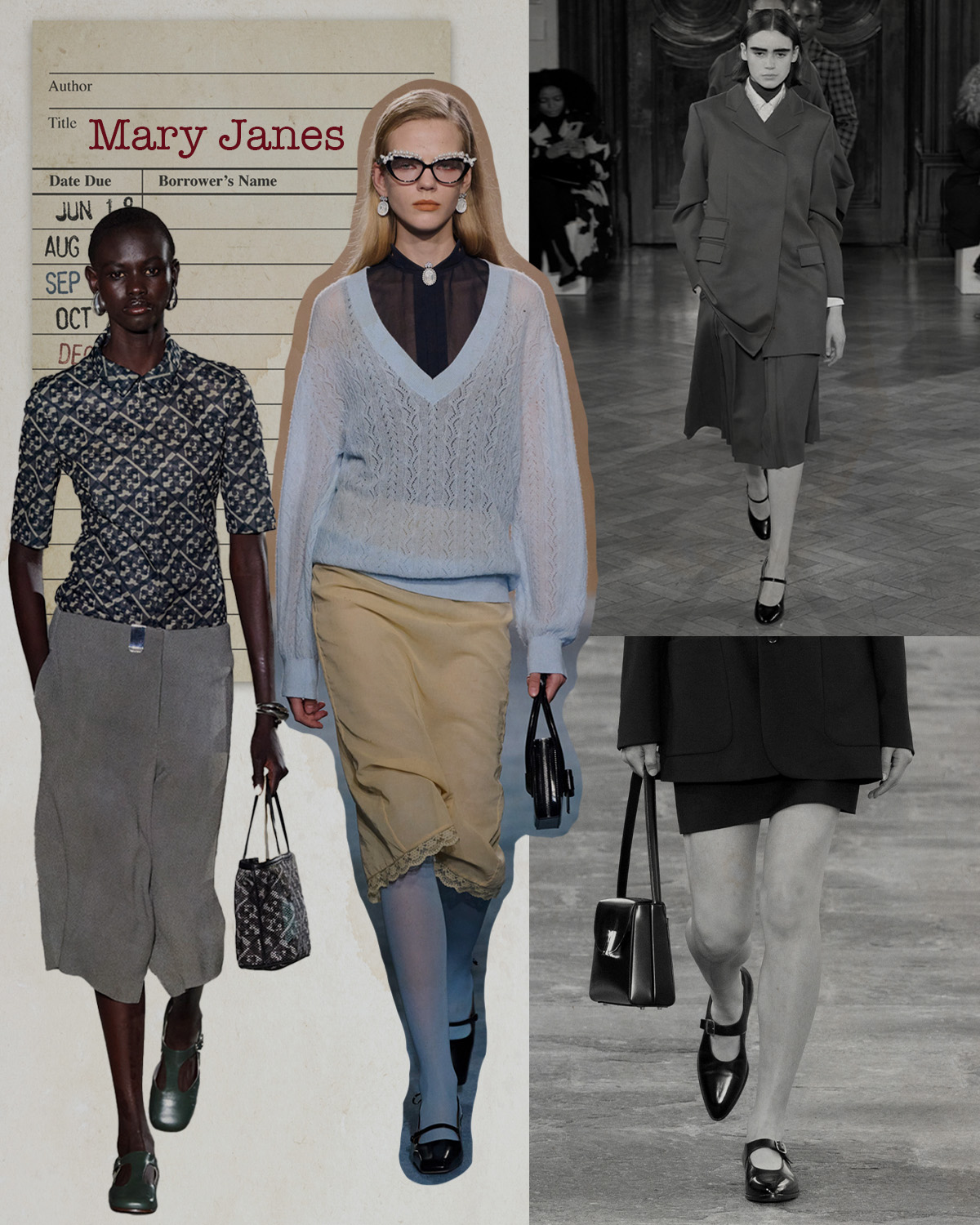
If you're constantly online, chances are you're already aware that Mary Janes are back in style, partially ushered in by the rise of balletcore fashion. We've seen this footwear become a fan favorite among the fashion crowd in recent seasons. But long before these shoes took over social media, they were a beloved staple among the geek-chic crowd. Though it's worth noting that loafers have also been long associated with the fashion aesthetic, for those wanting to err more on the side of chic rather than geek, this polished footwear is the move.
Mary Janes exude that elevated-but-effortless energy that so much of this aesthetic entails. Additionally, one could argue that with so many of the recent librarian-coded runway looks in spring collections (e.g., Tory Burch, Emilia Wickstead, and Bally) being styled with Mary Janes, our books have no other footwear worth mentioning.
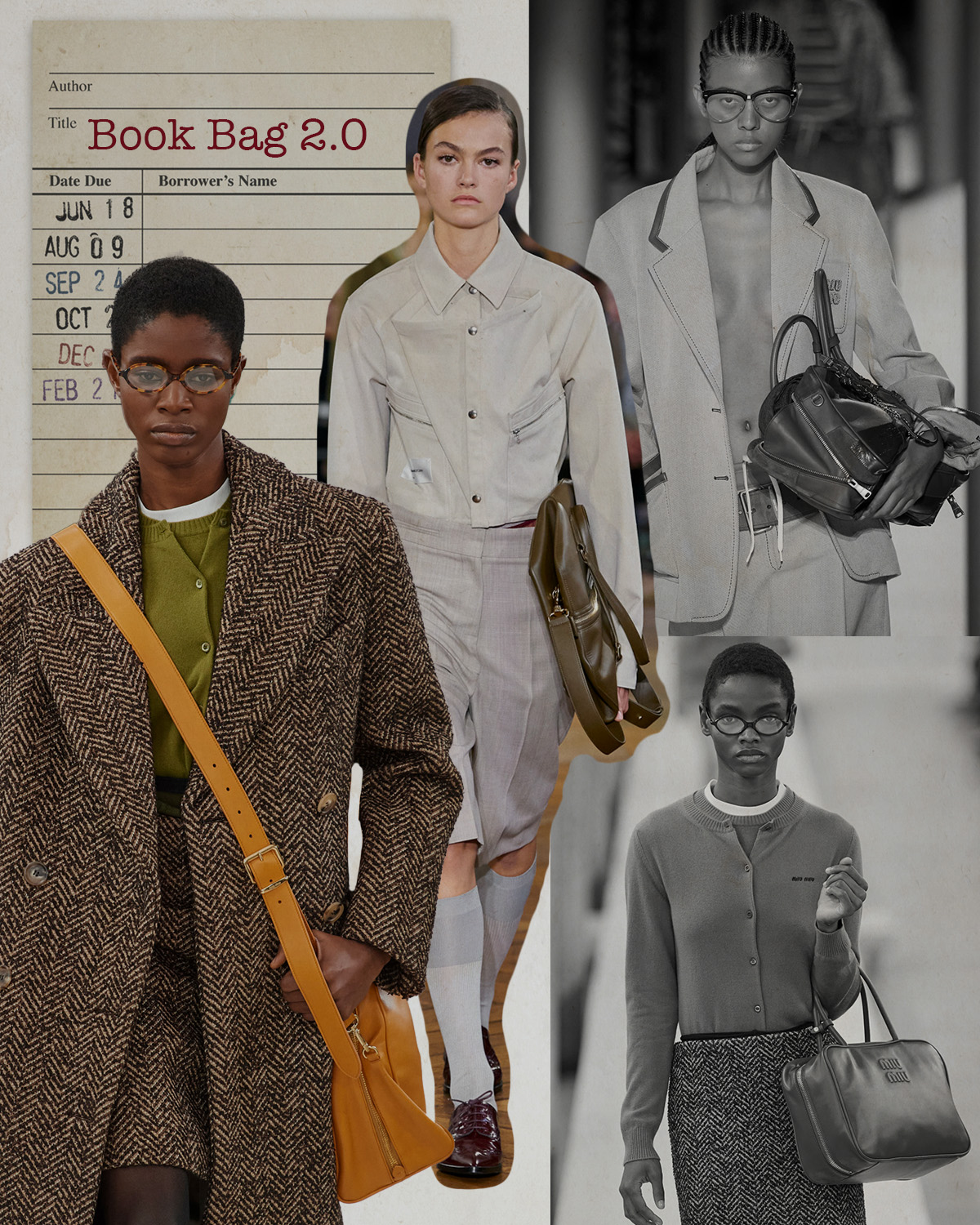
There's one more critical item for the geek-chic aesthetic: the book bag. Although seemingly banal, this bag has long been associated with bookworms. It's no secret that this community has been ostracized in fictional and actual life; reference all of the countless scenes in literature and films in which nerds are being bullied. During that over-depicted moment, we can imagine the nerd's backpack being flung by popular kids as the contents spill onto the floor. While we've seen how we relate to "outcasts" change, the need for a bag big enough for the bookworm has remained a constant, at least from a style perspective. They need to be able to carry their favorite literature, pencils, and maybe a change of clothes because of their perpetual clumsiness.
The most recent iteration of the geek's book bag is not a traditional backpack but a '90s-inspired bowling bag with spacious interiors, luxe leather, and minimalist hues. The otherwise stylish silhouette was given a nerdier feel by being stuffed to the brim at shows such as Miu Miu and Victoria Beckham. Frankly, with styles this chic, we can't imagine any modern-day geek tolerating someone grabbing their bag. After all, younger generations of geeks don't fly with those textbook examples of those who are deemed "dorky"—especially the fashion nerds, who will not let anybody reach for the Miu Miu bag. So much of how geeks have been defined from a historical context has long been rooted in upholding social hierarchies that other people based on their perceived intelligence, race, gender, personality, and so on. But with this trend over the years, we've seen that definition rewritten before our very four eyes (excuse the pun). It's allowed us all to turn the page into a new era of geek-chic fashion.
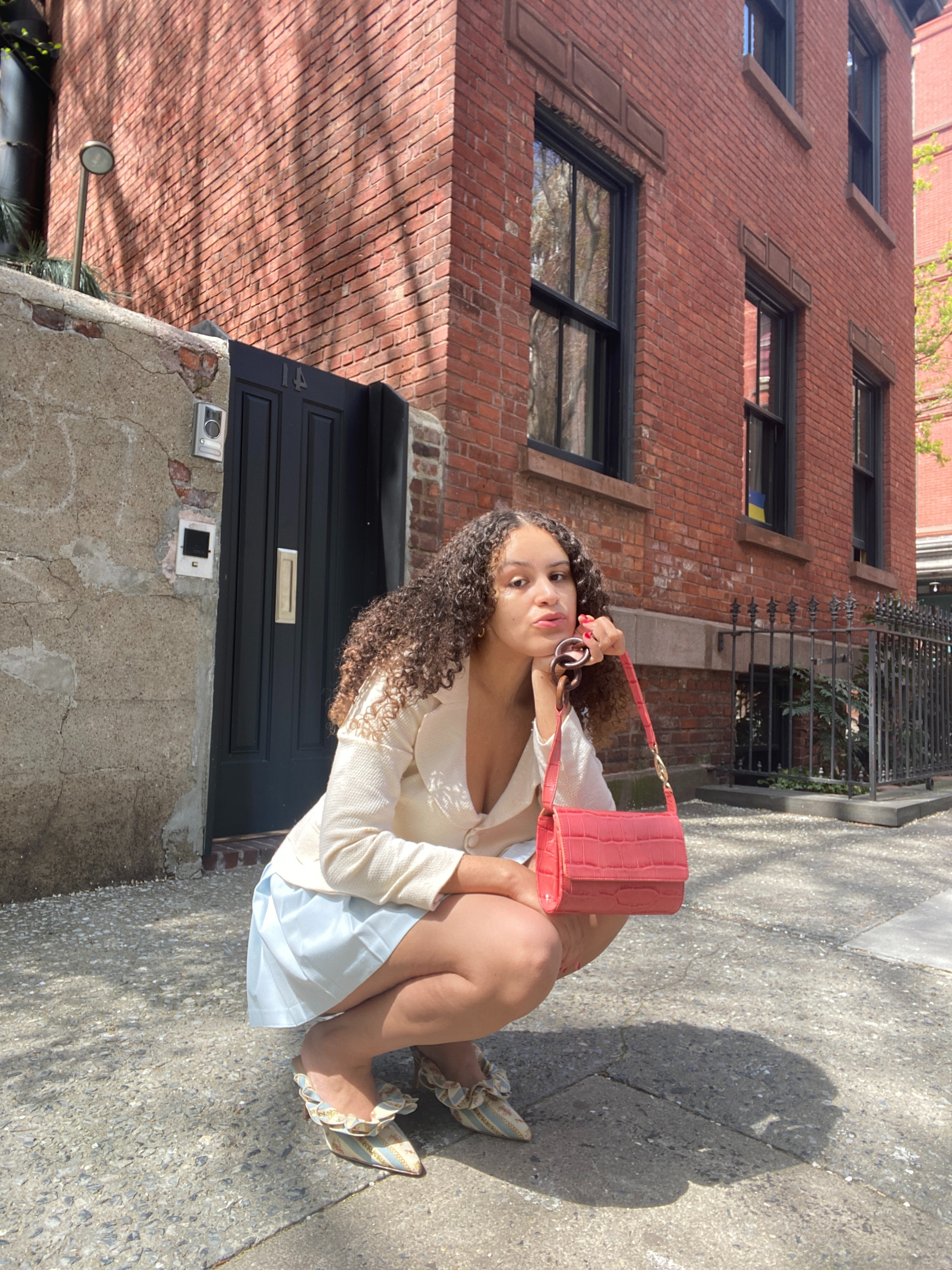
Jasmine Fox-Suliaman is a freelance writer and editor living in New York City. What began as a pastime (blogging on Tumblr) transformed into a lifelong passion for unveiling the connection between fashion and culture on the internet and in real life. Over the last decade, she's melded her extensive edit and social background to various on-staff positions at Who What Wear, MyDomaine, and Byrdie. More recently, she’s become a freelance contributor to other publications including Vogue, Editorialist, and The Cut. Off the clock, you can find her clutching her cell phone as she's constantly scrolling through TikTok and The RealReal, in search of the next cool thing.
